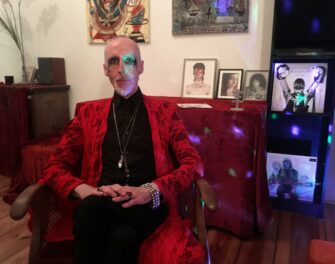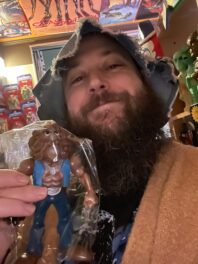For fans of 1990’s pop-punk – Specifically, the style that evolved on record labels Lookout! and Fat Wreck Chords; and was catapulted into worldwide popularity with the band Green Day – John Jughead Pierson will always be synonymous with Screeching Weasel. And while he still considers that band an important part of his identity and legacy, the man has always been about so much more: Actor, playwright, promoter, booker, musician, songwriter, author, entrepreneur & businessman.
I am proud to call him a friend, and honored that he agreed to share his remarkable life story with The Aither.
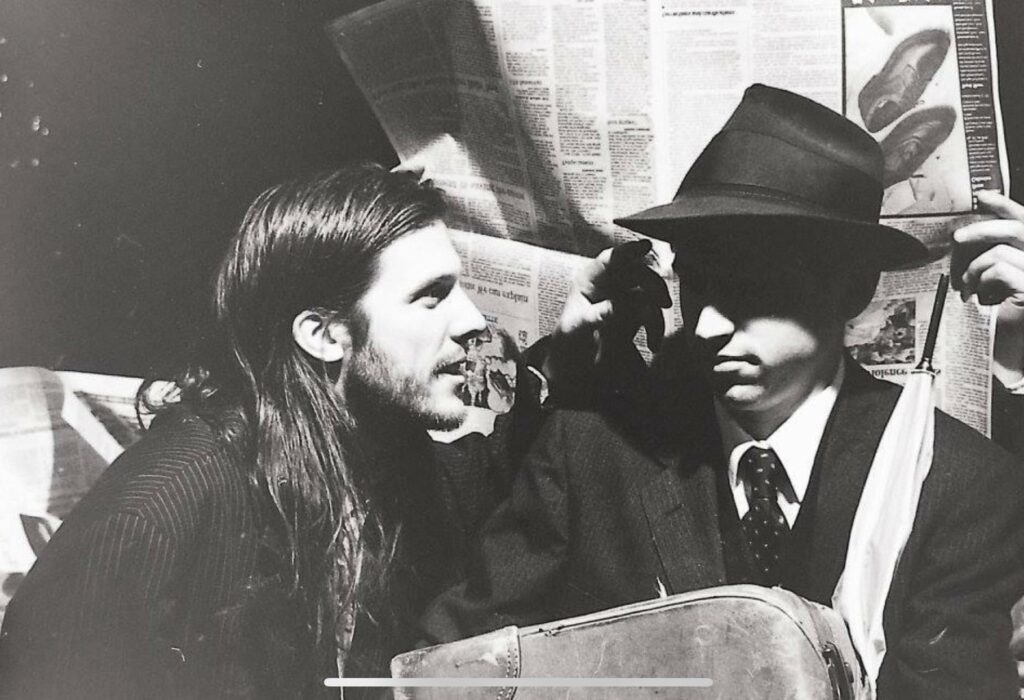
Screeching Weasel – and especially John’s relationship with its curmudgeonly, irascible lead singer Ben Weasel (aka Ben Foster) – has become the stuff of urban legend. This interview will hopefully set the record straight, and introduce you to one of the most talented, multi-faceted, generous, and well-liked people it’s been my privilege to know.
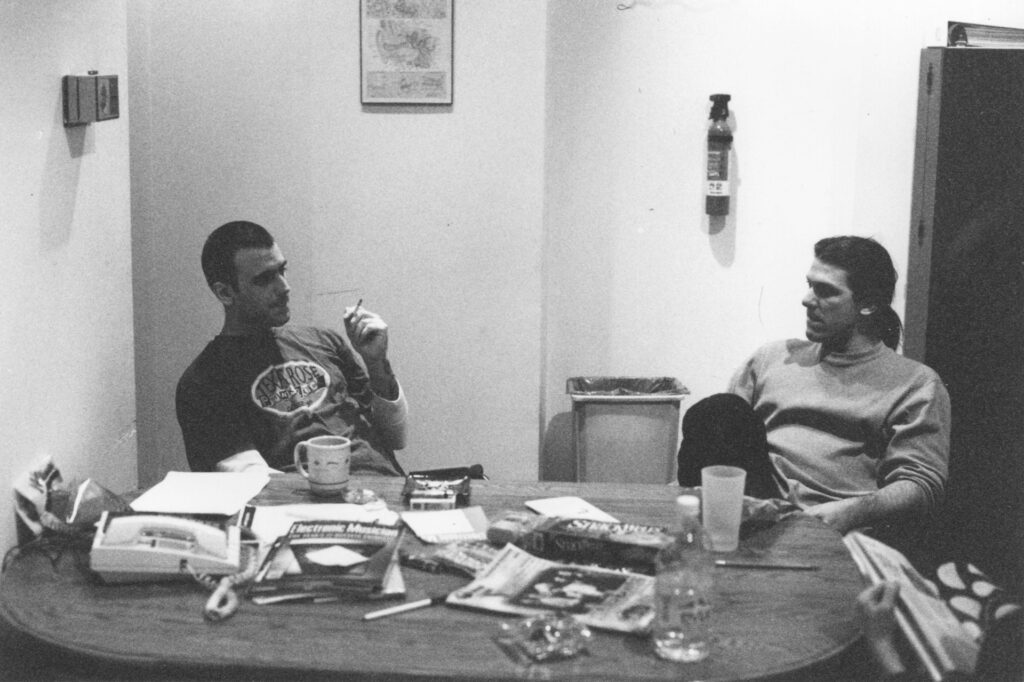
Photo by Tim Carlson.
Take a dive into the world of John Jughead Pierson, below:
Please describe some memories – such as art, music, friendships, adventures, study, romance, politics, work, religion, crime… anything really – from the stages of your life noted below:
* Your Childhood:
I used to pretend I had friends that were spies that lived in the trees surrounding my house. This allowed me to have an excuse to put my life in jeopardy, to climb high places in order to retrieve important messages, correspondences and formulas.
At one point I actually bought an attaché case at our neighbor’s garage sale and walked around the neighborhood with a tape recorder tucked inside playing the theme from “Get Smart!”
* Your Teenhood:
When I was a teen I met Matt Nelson and we bonded over the concept of absurdity; not making sense made complete sense to us.
One day in high school, a girl I liked gave me a round sticker that had a bulldog on it. I had no idea what it was supposed to be but I stuck it on my neck, right below my Adam’s apple.
She thought that was funny.
I promised her I would leave it there.
It stayed there for a couple weeks. I would cover it in showers to make sure it didn’t fall off.
Each day at school when someone would ask me what it was, Matt and I would riff on its meaning and add a word to its name. The name grew long fairly quickly, and I still remember it to this day. Its name was Bull Shaped Rock N Roll Tweezers (clap.) The (clap) was actually a clap. When we said the name, we would clap. You could not say the name without clapping. This turned into a joke where if someone had something in their hands, if someone began saying the phrase, by the time it got to (clap,) everyone had to clap no matter what was in our hands.
One day in the cafeteria, Matt yelled “Bull Shaped Rock N Roll Tweezers” from across the room and I clapped and dropped my tray of food onto the ground. And I was pretty poor, so I did not eat that day.
Things like this happened on many occasions. We thought it was funny.
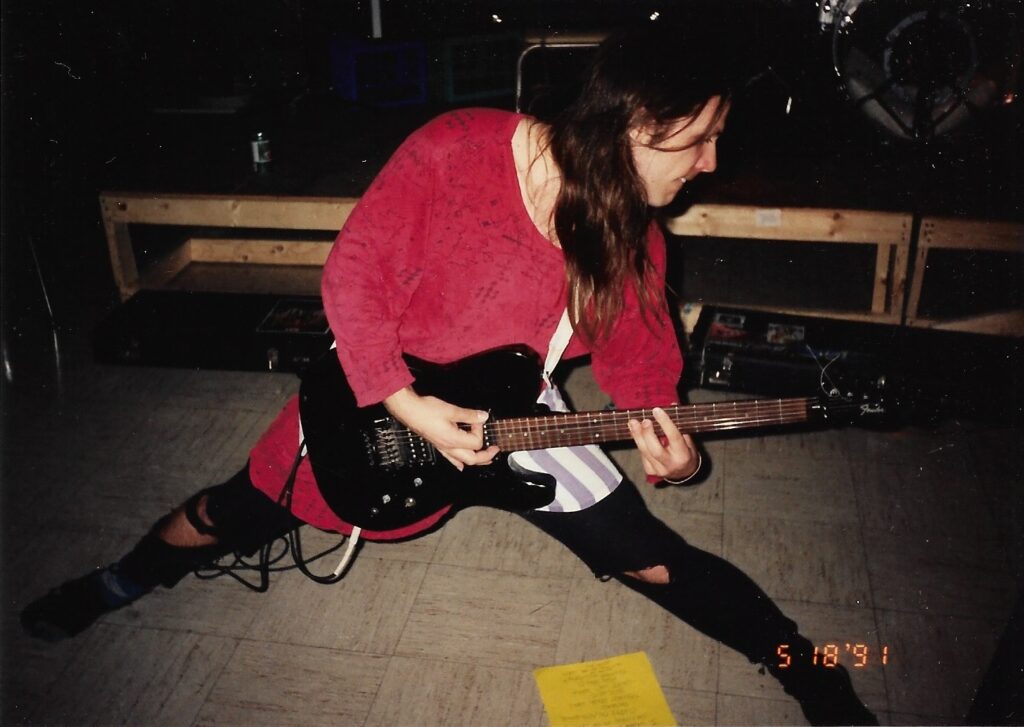
Circa May 1991 at The Loft, in Madison Wisconsin.
* Your 20’s:
When I was 19, I met Ben Foster (aka Ben Weasel) for the third time. We worked at General Cinemas together in Mt. Prospect. So in my 20’s, he and I were forming the band Screeching Weasel, which took up a great deal of my time.
I hated driving, but because of that connection between the two of us, I had to learn to drive across the country, through deserts and over mountains to tour from town to town. It was my job to stay calm, but I was screaming on the inside every time I got behind that wheel.
One of my memories was driving through the mountains during a snowstorm and our headlights would go off every time I stepped on the brakes. I almost crashed us into the back of a truck. I pulled off the side of the road and got out of the car without putting it in park.
Ben had to jump from the passenger’s seat to the driver’s seat in order to stop it from careening into a metal fence and off the mountain cliff.
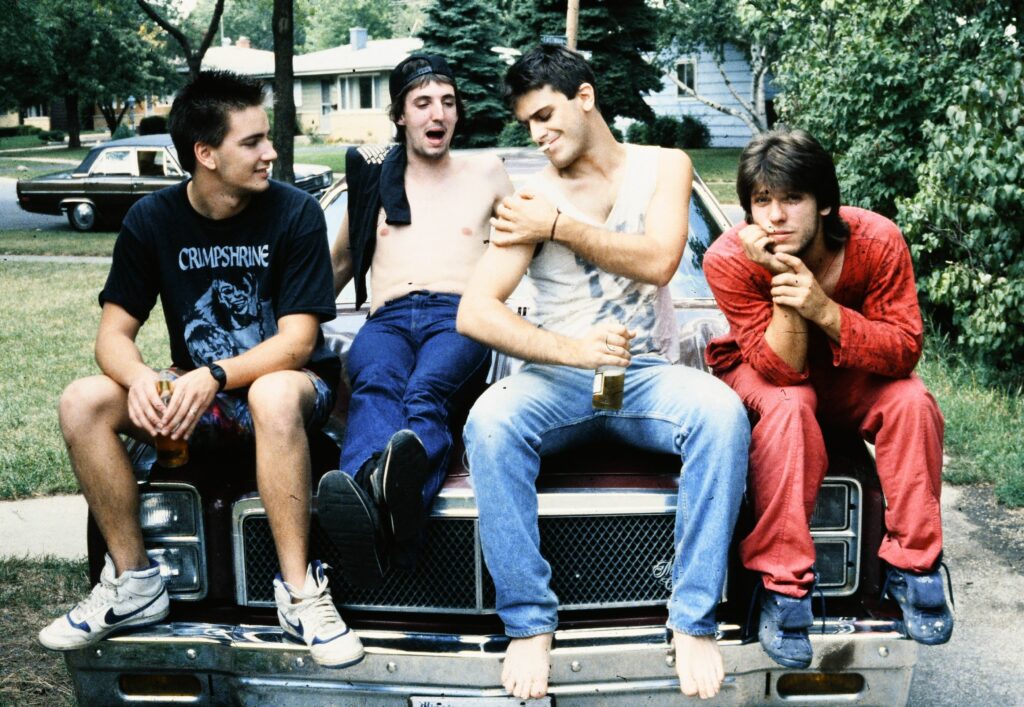
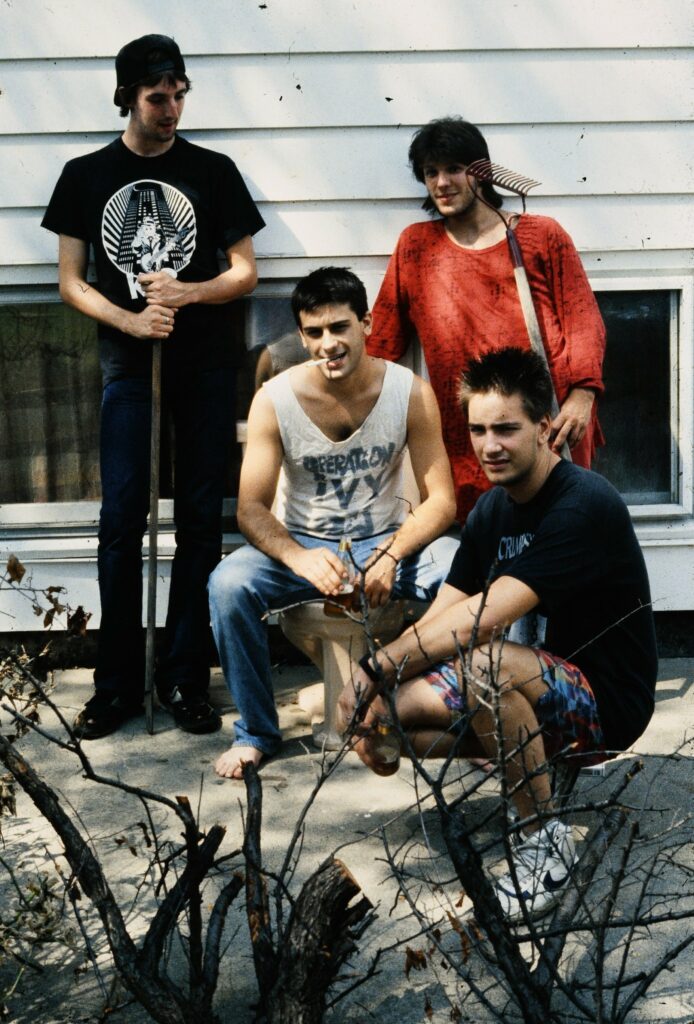
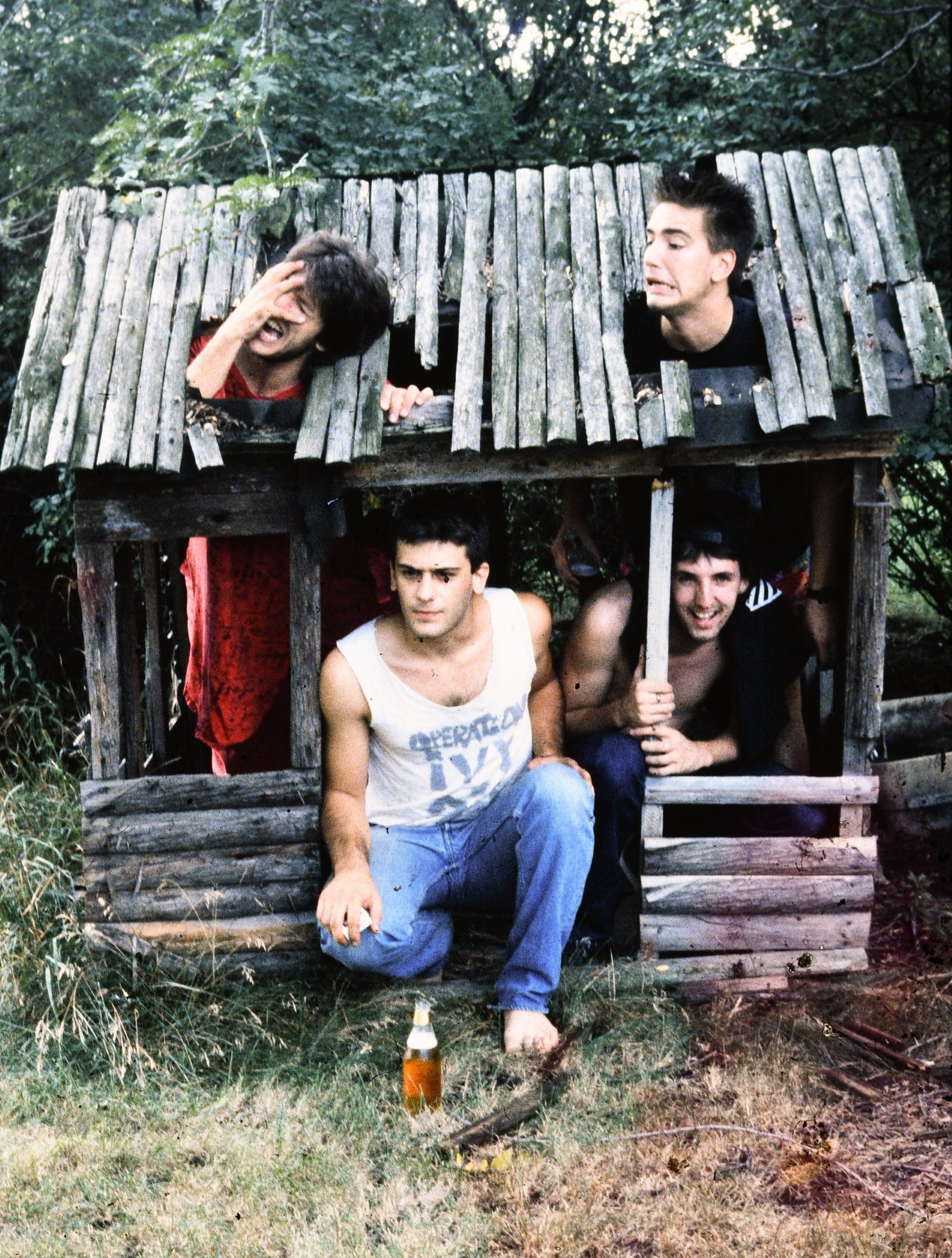
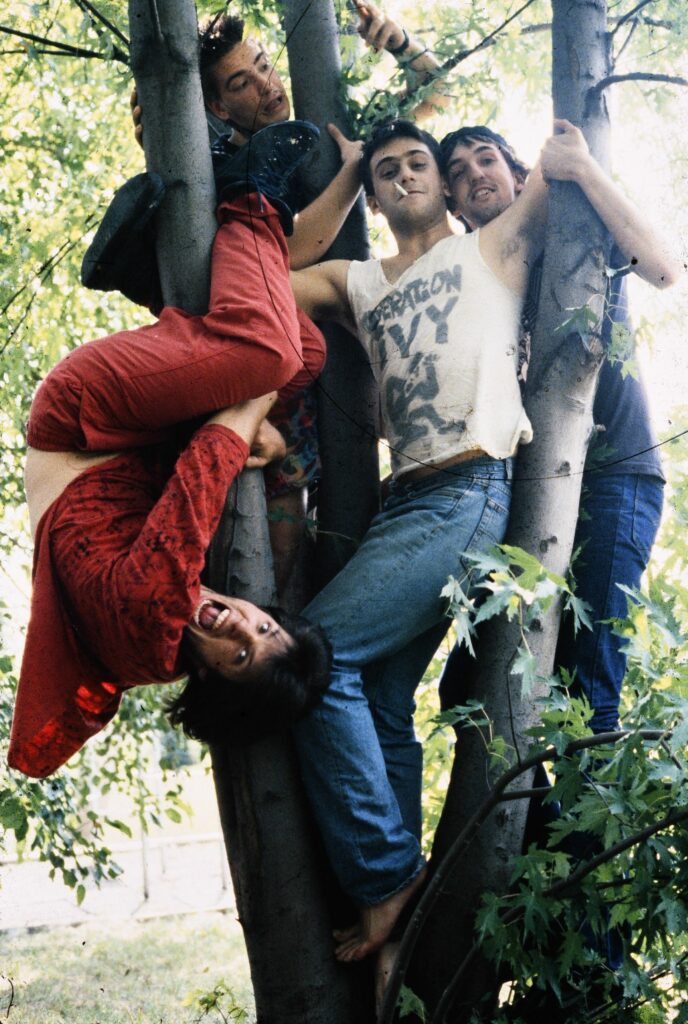
Taken by Tim Carlson at John’s old family home, and his sister’s old childhood log cabin.
* Your 30’s:
In my 30’s, I bought a house with my best friend from high school.
During this time my life was balanced between music and theater. When I joined my long-term theater company, the Neo Futurists (which performed every weekend 50 weeks a year,) I told them that I would be responsible and dedicated to the company. But if my band were ever to make plans to record or go on tour, that would always take precedence.
I think because of my outright honesty about this point, and my talent, the company took me in. I ended up dedicating most of my time to that theatrical pursuit instead of music, as Ben began to move more and more away from performing live and recording.
One memorable play I wrote while in this company involved exposing my ass to the audience in a spotlight, as an astronaut landed on my butt cheek and planted a flag in my asscrack, all while John Kennedy spoke over the loudspeakers about the Space Race to the instrumental backing music from “2001: A Space Odyssey.”
In many ways, I feel I became a better songwriter and writer not because of Screeching Weasel and my musical pursuits at that time, but because of my zealous dedication to writing short non-illusory plays for theater.
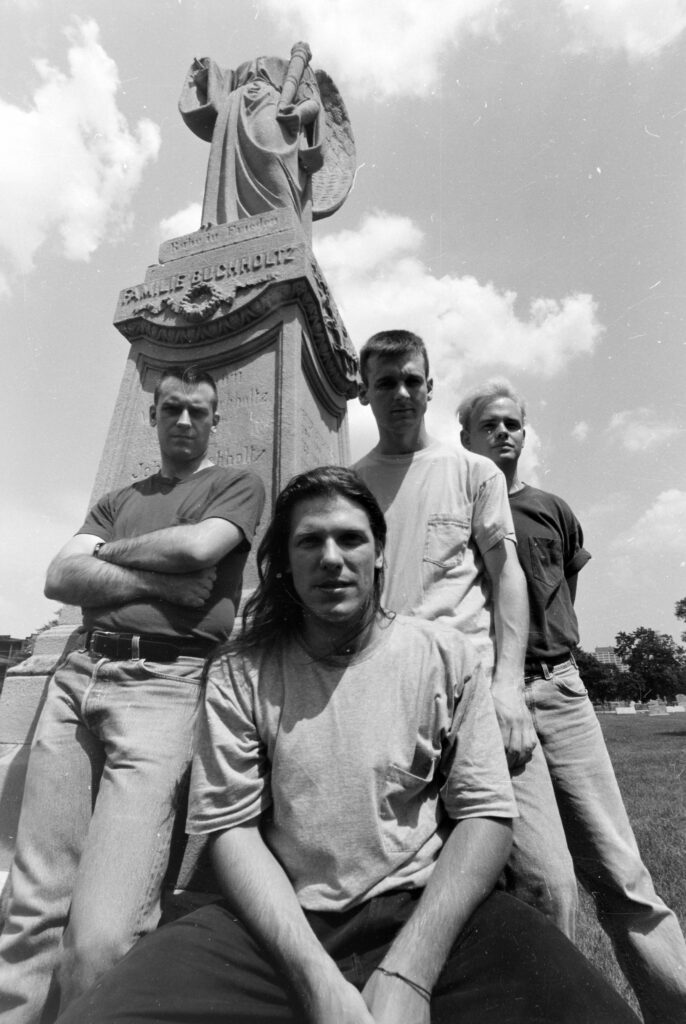
Photo by Tim Carlson, at St. Boniface Catholic Cemetery.
* Your 40’s:
I always thought I would be dead by the age of 45. It never happened.
Instead I wrote two novels, founded a new band called Even In Blackouts, started my own publishing company, toured the Midwest in a puppet theater, lost my mind, broke my body, shaved my head, lost 40 pounds, gained it back, grew my hair long again, and traveled the world.
This was probably the most out of control part of my life. In past and future years, I did and would do much crazier things, but I never felt so much like someone else was in my head making my choices than during this time period.
I spend these days in my 50’s understanding that time period and putting myself back on a path I see fit for myself.
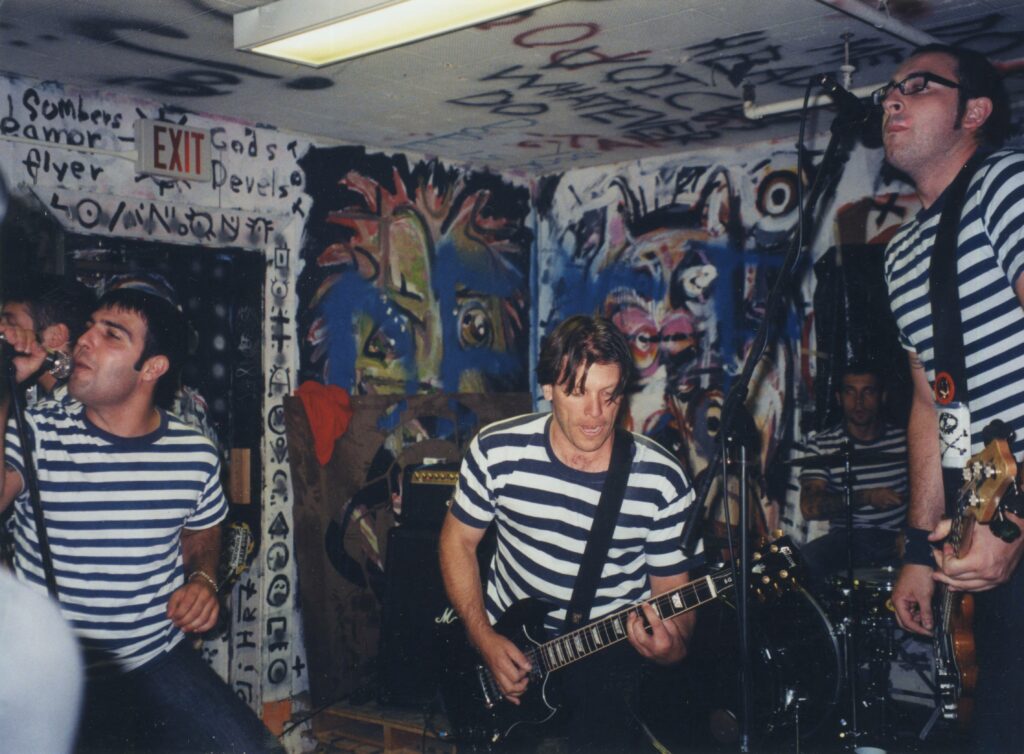
As part of their US tour, were John played 2nd guitar.
* Your 50’s:
In my 50’s, I took a job at Universal Studios in Japan and I have now been splitting my time between Chicago and Osaka.
I started two new bands, The Mitochondriacs and Semi Famous.
As I write this I am in Osaka drinking Chuhi and eating Spicy Ramen.
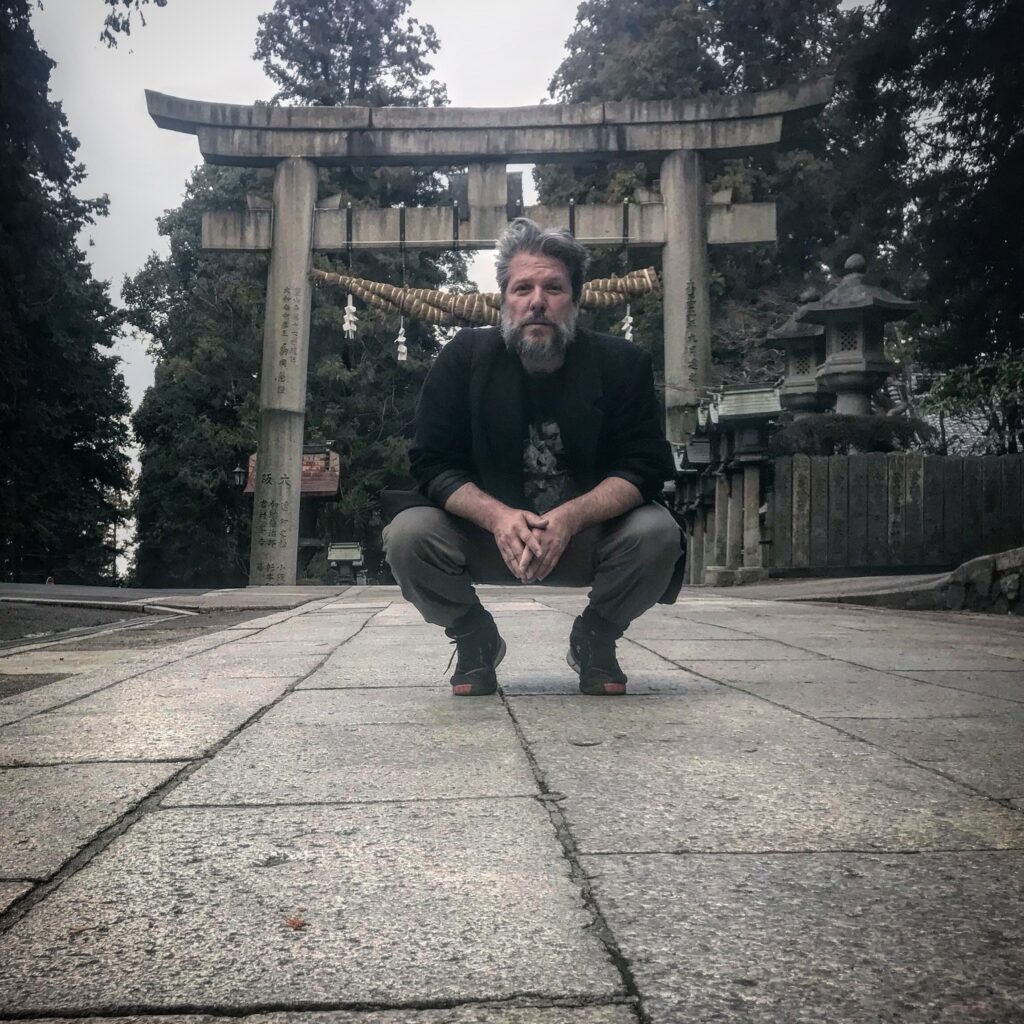
Wikipedia’s Screeching Weasel page says that you and Ben Weasel formed the band in 1982, but your personal Wiki page says 1986.
Let’s clear that up.
My memory is that you guys met in high school (possibly on the wrestling team, if I’m remembering correctly?)
Did you immediately bond over punk rock and decide to form a band?
And was the first name All Night Garage Sale but changed to Screaming Weasel after someone suggested the name Screaming Otter?
And did you already have the nickname Jughead or did that come later?
Ben and I met circa 1980 at River Trails Junior High, we were not really friends but we were on the wrestling team together. I was in wrestling because my brother had wrestled a few years earlier, so my teachers thought I should too. Ben was there because he was always in trouble and was basically put there to keep busy and out of harm’s way.
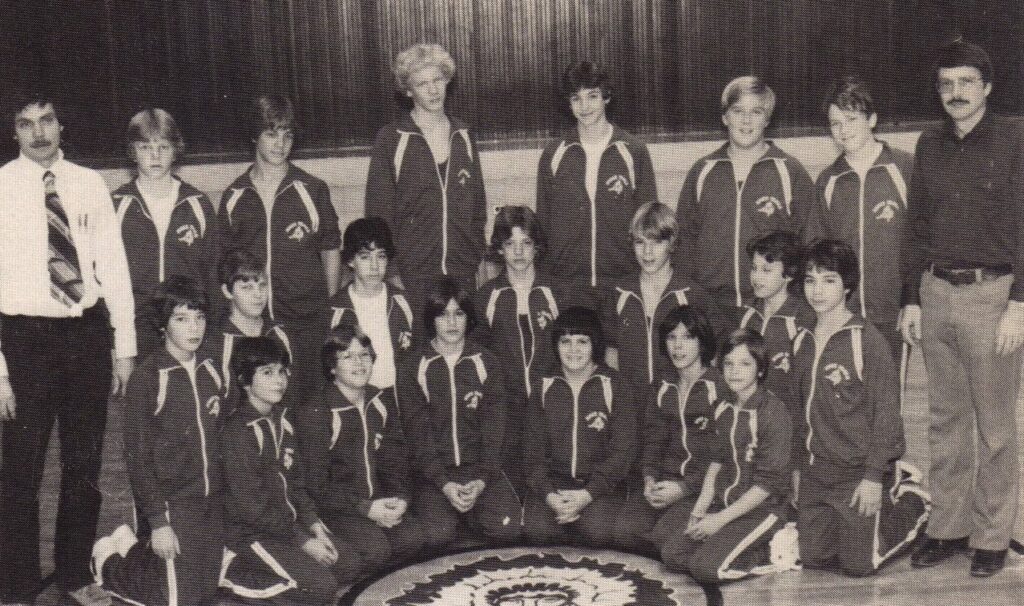
With John visible at bottom row, second from the right.
…and Ben visible at bottom row, third from the left.
We did not meet at all in high school. I went to Hersey High School and Ben went to many high schools before he was sent away to Maine. I saw him one day in the halls sitting in an area awaiting a meeting with the principal. That was the only time I saw him during those high school years.
I met Ben again when we worked together at General Cinemas in Mt. Prospect near Randhurst Shopping Mall circa 1986. This is where Ben and I started hanging out casually. We were both interested in the idea of starting a punk band… so we did.
One day while Ben was driving me home from our band practice, we drove by a sign that said, Garage Sale. It was night, so one of us joked about the band name All Night Garage Sale.
It was never a good name, but we needed one to send a demo tape to MRR.
If I am not mistaken, they printed the lyrics to “I Hate Old Folks.”
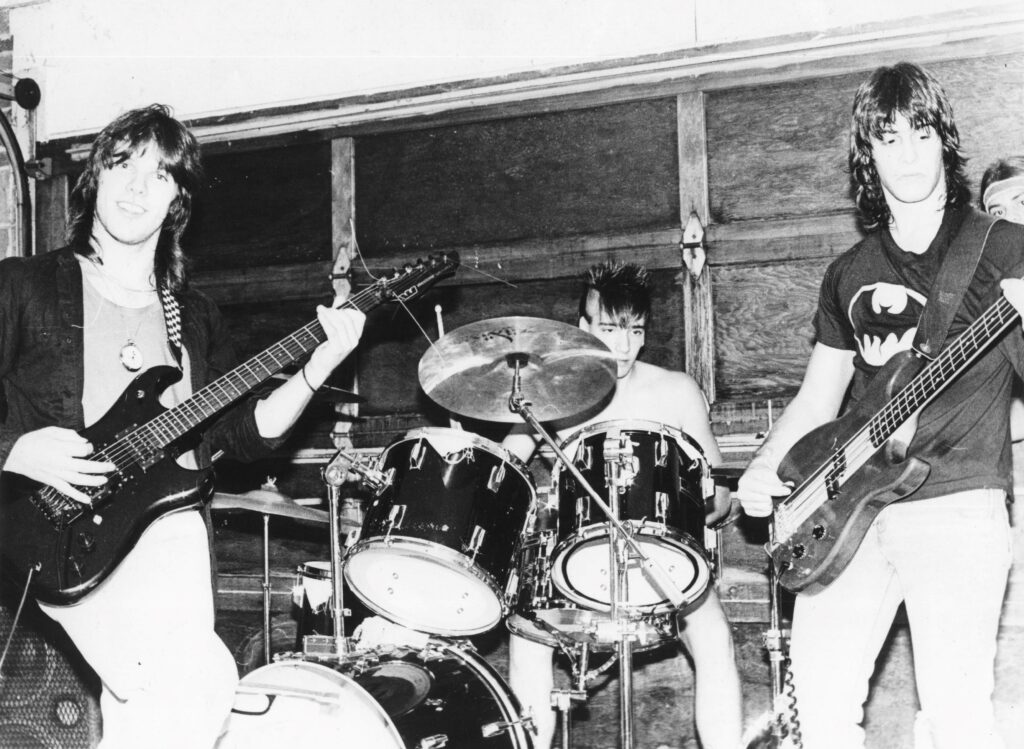
Photo by Tim Carlson.
We were never called Screaming Weasel. It was always Screeching Weasel.
We were standing in the lobby of the movie theater and my two friends Matt Carlson and Matt Nelson stopped by to say hello. One of them had a shirt that said something like, “There is a screaming otter in my pants.” We thought that was pretty funny. And through all of us riffing on titles, within seconds it went from Screaming Otter to Screeching Weasel.
I don’t know who coined the phrase but I can still hear and see Matt Carlson yelling in a falsetto voice at the top of his lungs in the crowded lobby, “Screeching WEEEEAAAASEL!”
I got the name Jughead because I often wore a bright yellow shirt bought from Merry Go Round that I got from my girlfriend at the time. I never liked The Archies but the shirt was bright yellow and somewhat annoying to the eyes, and that made me smile. So the name Jughead was suggested by Ben for my name in the band.
It stuck more solidly to me because I used to juggle at shows, and it made sense to keep this name reminiscent of the shirt and the juggling.
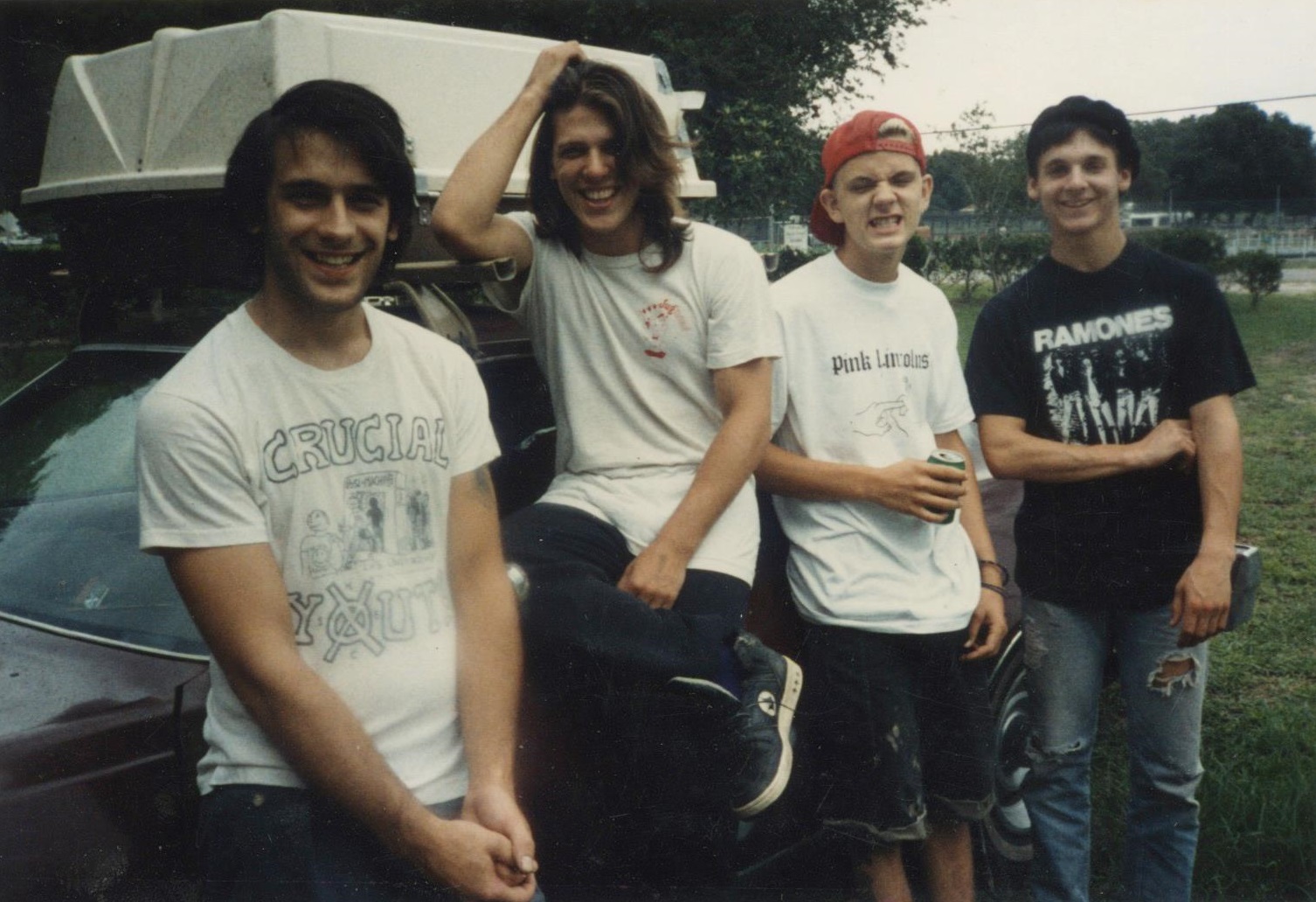
Photo by Chris Barrows, taken at Chris Barrow’s Trailer Park in Tampa, Florida, USA.
We know that nearby Chicago had a bustling punk scene in the early 1980’s but what was Prospect Heights like?
Were kids into punk when you were a teenager or were the suburbs lagging behind the city?
When you formed Screeching Weasel, was there any kind of infrastructure in town (places and people that did shows, college radio, record stores, labels) or did you have to build all that from the ground up?
My first experience with local bands was No Empathy; their first incarnation was pretty damn hardcore, and they would play these underage, juice-only dance clubs near me. They proceeded us.
During this time, we would also travel downtown to The Metro to see The Replacements, Circle Jerks, and local heroes Naked Raygun. But I was not aware of much punk being played besides us and our friends.
Most of the time, even if you had a suburban band, you would either have to play in a basement or travel to the city and try to get booked in a club that allowed you to play even if you were under 21. Places like Batteries Not Included.
In the suburbs, I think Durty Nellies in Palentine was one of the few if not the only club that allowed consistent shows to occur, enough to garner a fairly good audience. We became a part of that, and eventually became the people booking and promoting those shows.
Prospect Heights was very small, I was actually from Mt. Prospect which was slightly less small. Ben was in unincorporated Prospects Heights, which to me just meant they didn’t have sidewalks. I was about 20 minutes walking distance away in the incorporated Mt. Prospect, with plenty of sidewalks.
Neither place had music venues for us.
There was a place that my brothers used to go to in the 70’s that booked metal bands, which was their punk. The place was called Beginnings. By the time I was of age there was nothing.
All this said, talking about towns is pretty much irrelevant when you are only about 30 minutes away from one of the best cities in the country, Chicago. Once you found a way to get there, your world expanded.
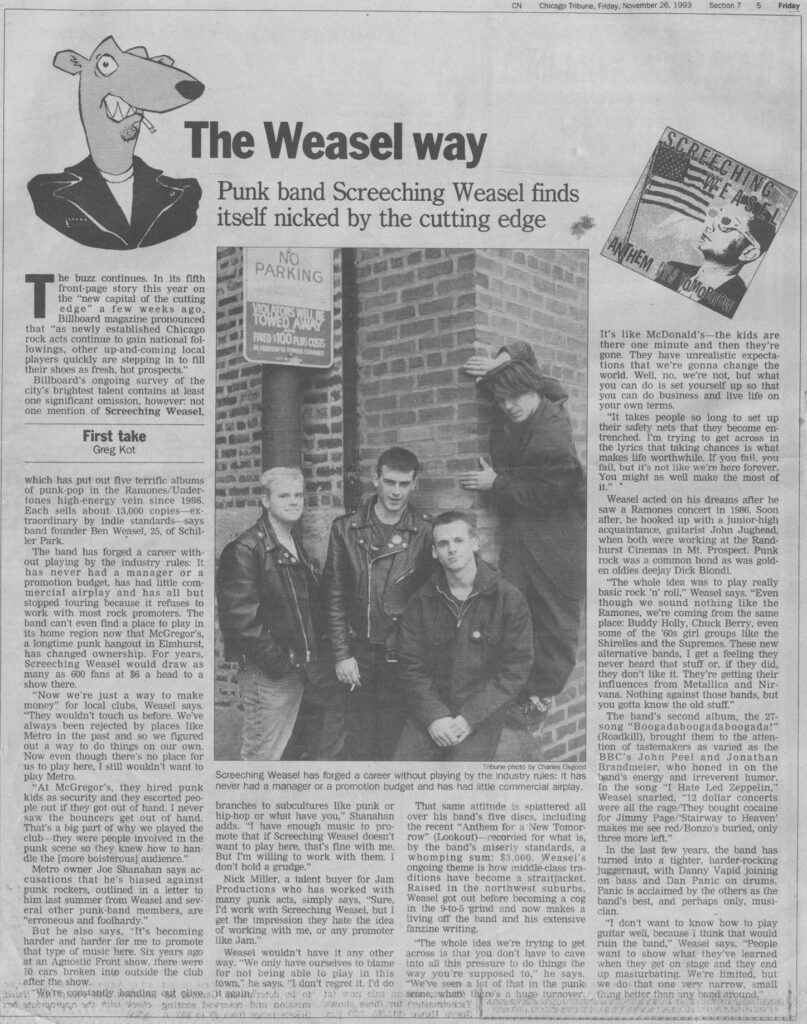
I became aware of Screeching Weasel because I was already pen pals with Russ Forster, who released the first SW album on his Underdog Records.
How did you meet Russ, and can you talk a little about his legacy and influence in that scene?
We started hanging out with Russ at the aforementioned Batteries Not Included. I am pretty sure that we played with his band Fudgetunnel. At Batteries Not Included, we started a network of people that were in the city or in the near suburbs, people such as Doug Ward from ID Under, Larry DaMore and his band Bhopal Stiffs, plus people like Glen Herman and eventually Dan Schafer.
Russ was one of the few that had the know-how and enough cash to start actually printing full-length records. He was a big advocate of Steve Albini and any underground music that was circulating around the Chicago scene. He was a bit like a Larry Livermore but had his eye less on the best of the scene and focused more on the rebels of the scene.
I respected him endlessly and still see him occasionally when I visit him in San Francisco where he makes a living easing people into death – and that is not figuratively, that is full heartedly literal. Much of this is discussed in the podcast I did with him on Jughead’s Basement. His words are better than mine, and his knowledge of music blows mine away.
(You can hear Russ’ interview at: https://www.podomatic.com/podcasts/jugheadsbasementtnh/episodes/2022-05-03T12_48_37-07_00)
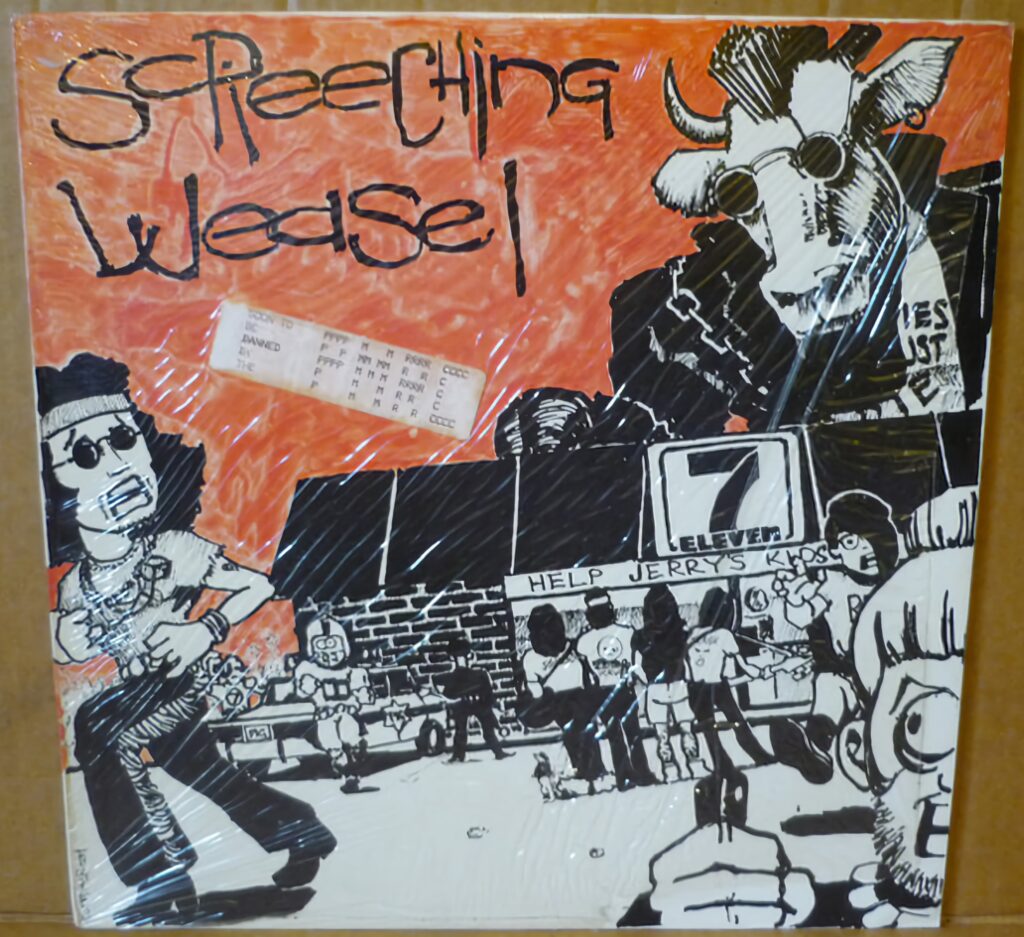
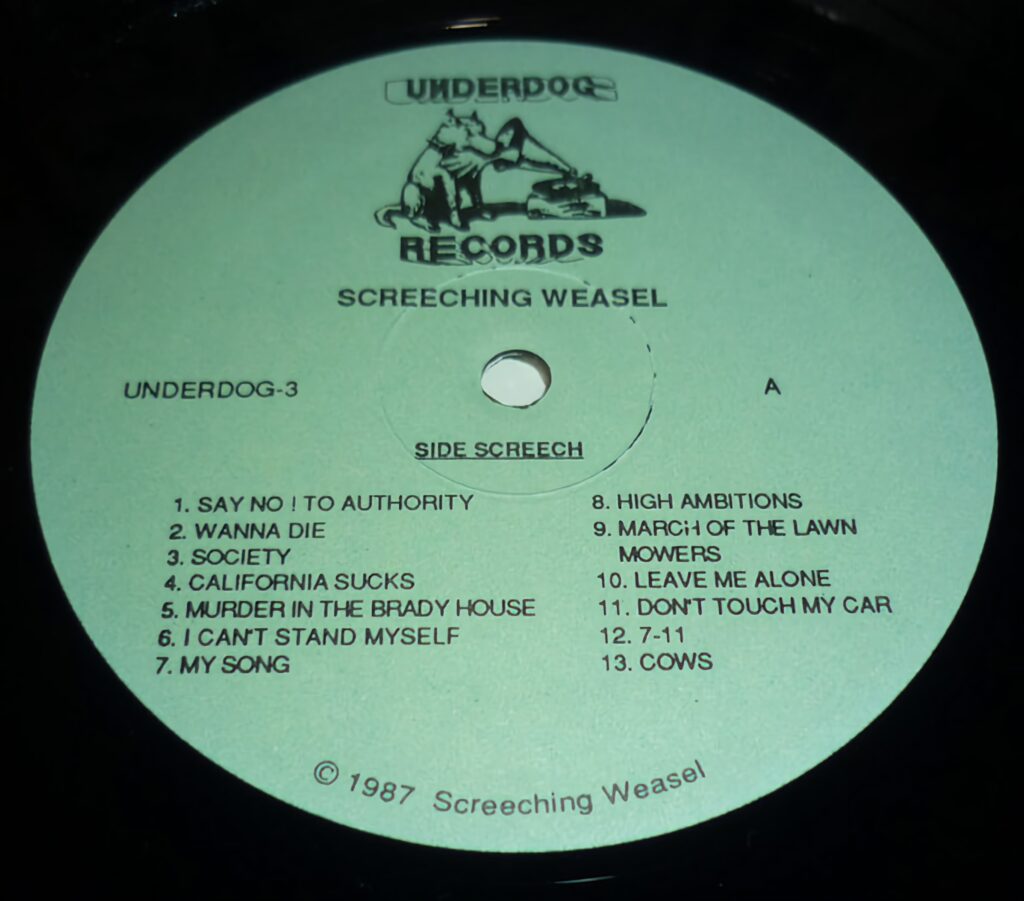
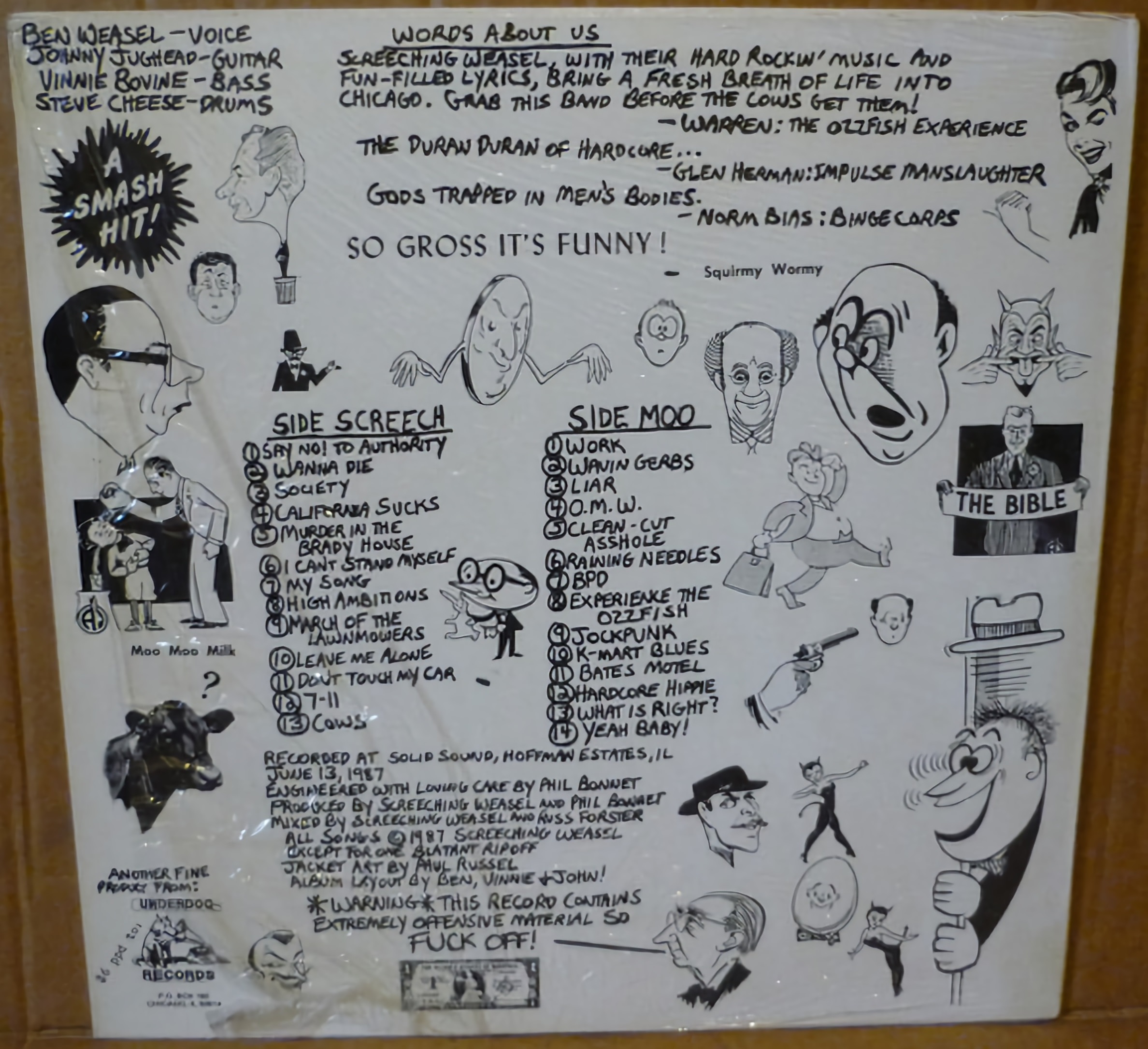
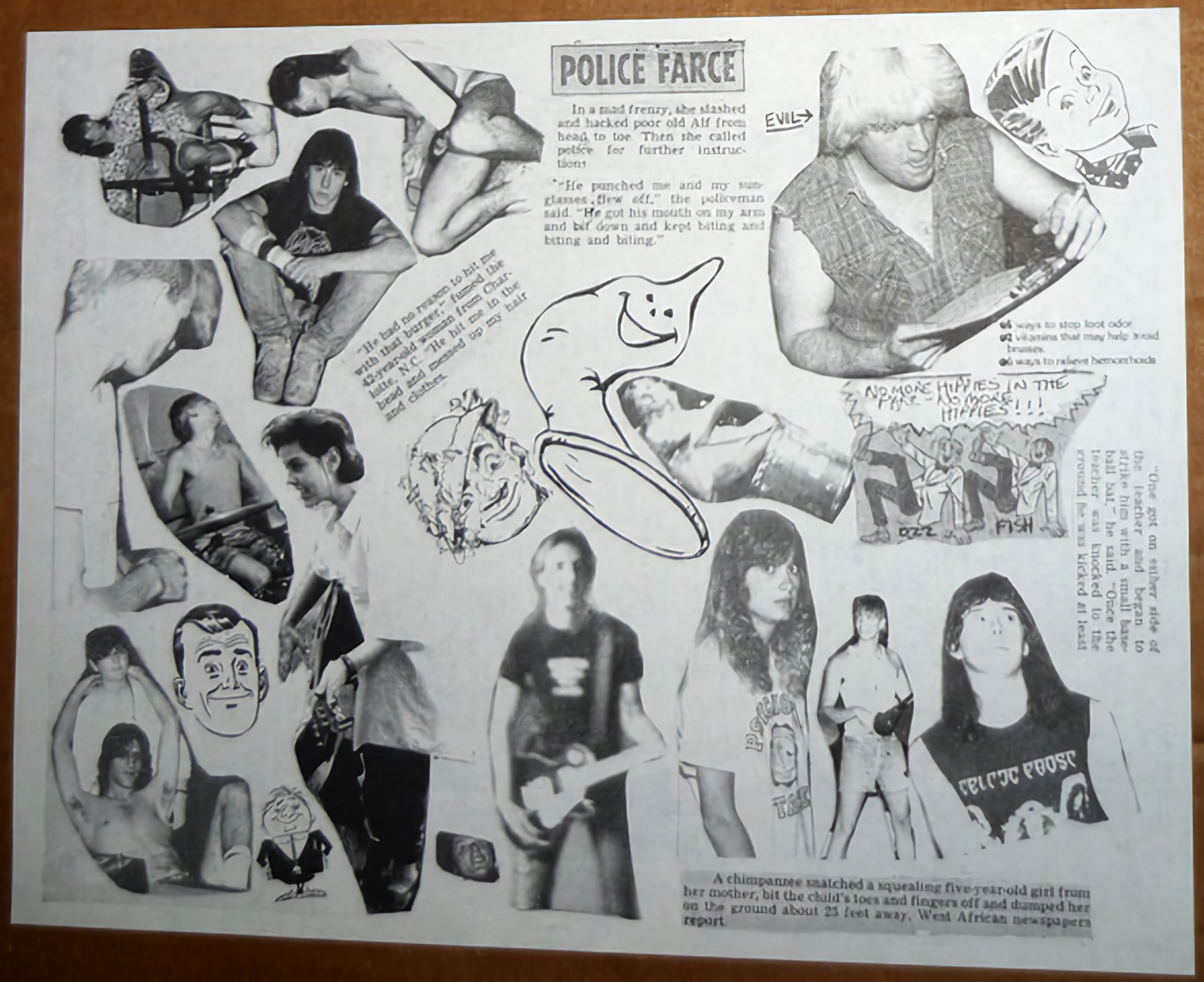
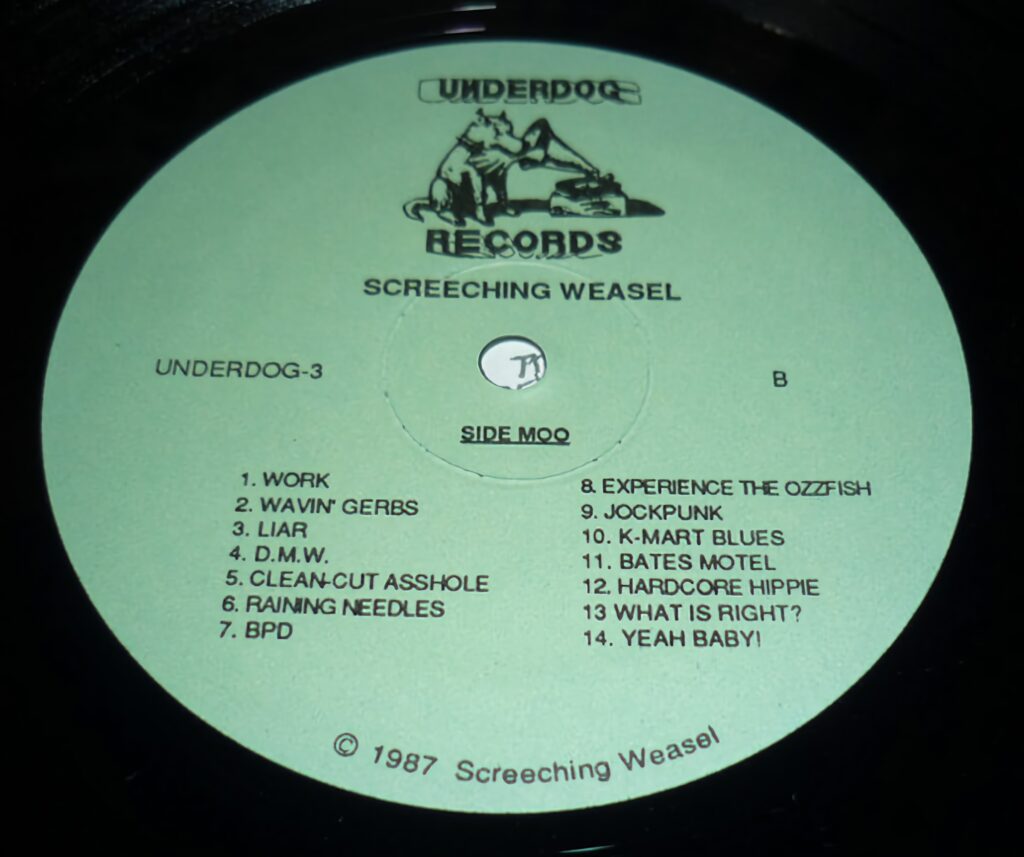
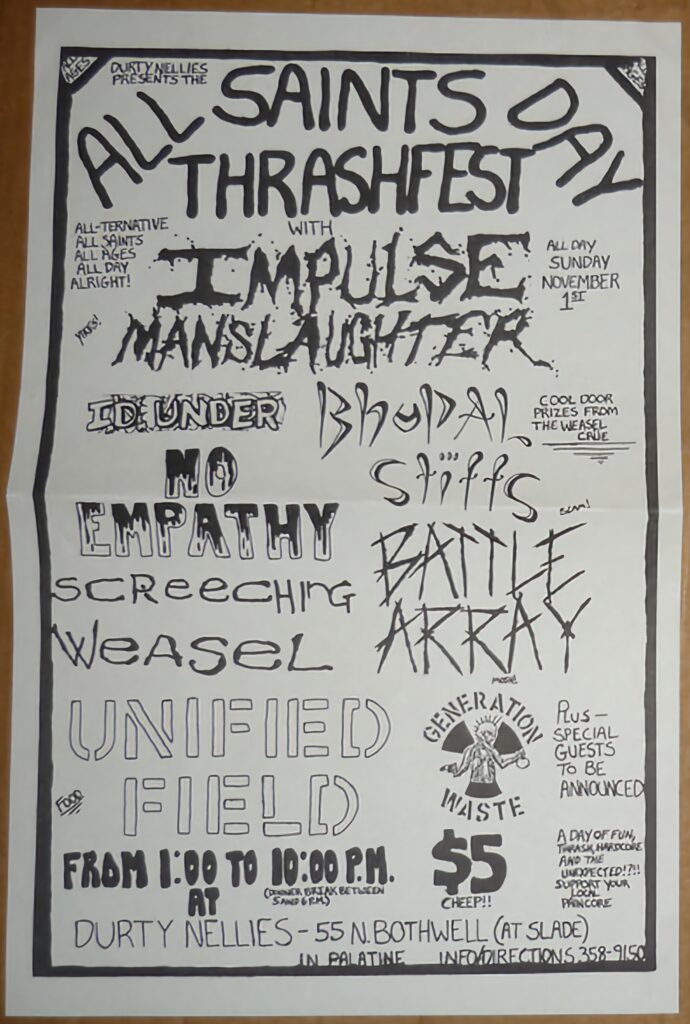
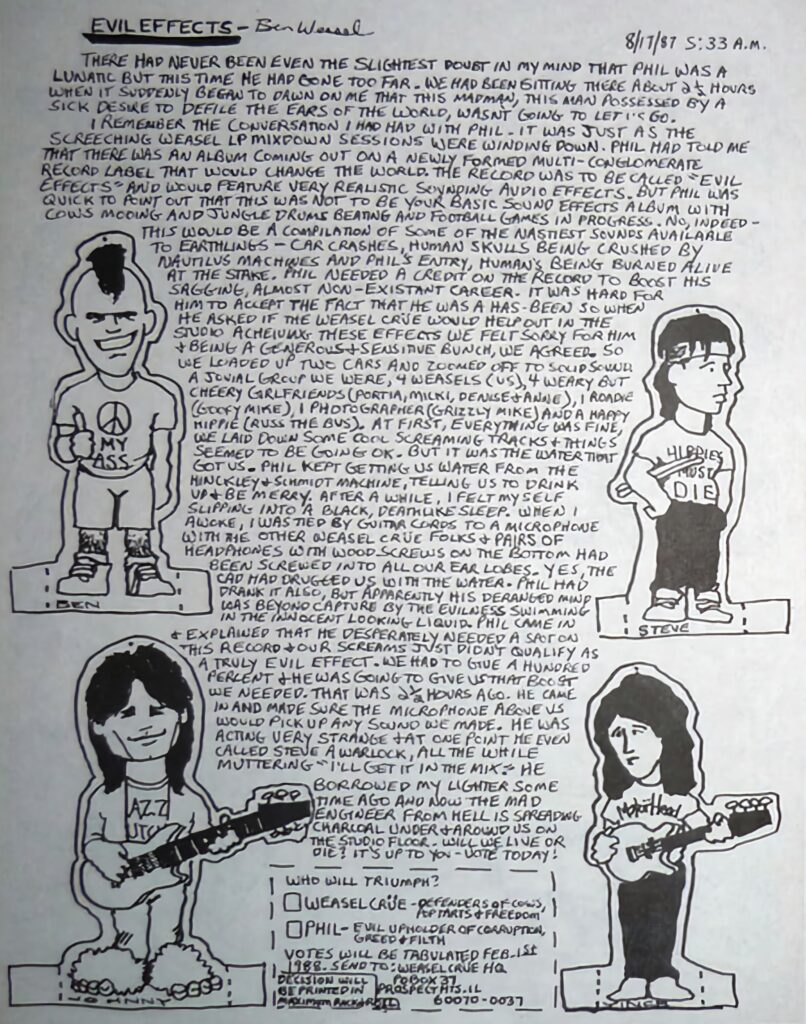


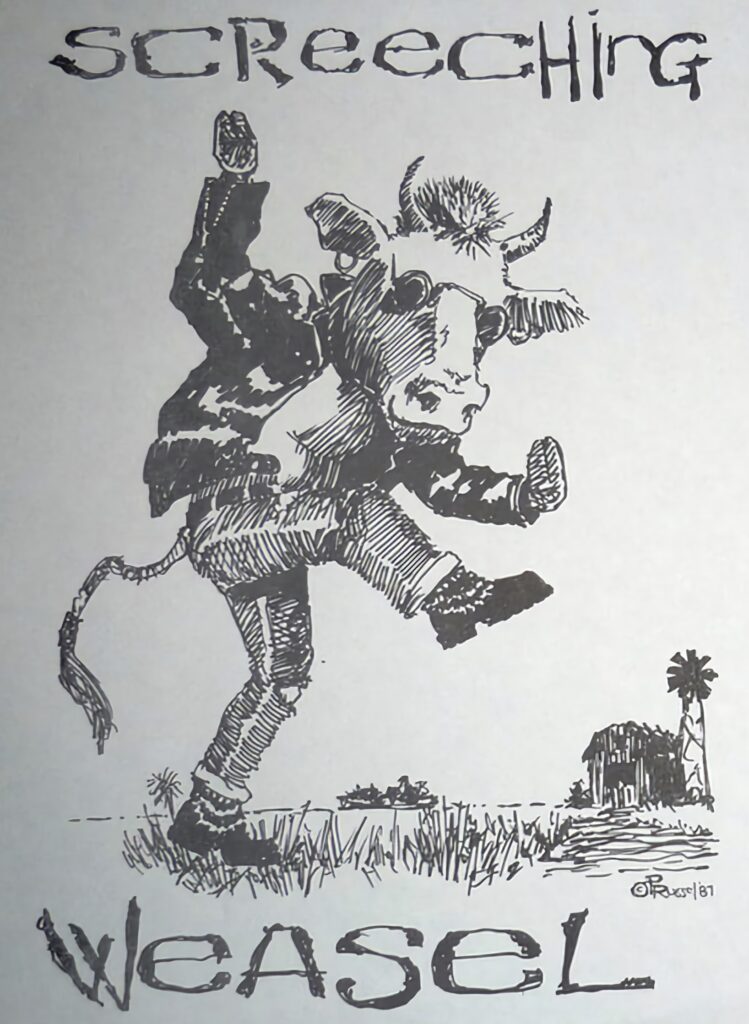
Released by Underdog Records in 1987.
Russ mailed me the Screeching Weasel record and I loved it immediately, as much for the goofy inserts and album art as the music. At the time, NYC was deep in the thrall of straightedge youth crew hardcore, a scene that had almost no sense of humor, while Screeching Weasel was – besides loud and fast – very funny.
Was that always the intention, and how much of that was influenced by Jersey/Philly bands like AOD and Dead Milkmen?
Parody songs and highly critical lyrical jabs under the guise of humor were a natural breeding ground for Ben’s take on what happened to him in his younger days.
I think one of the things Ben and I shared was a distrust of people that were too overtly serious. It just reeked of hubris to me. We at different points could be accused of that too, but I do feel that a biting humor was embedded in the band from the very beginning.
We both had quite troubling upbringings and I think we bonded on a bit of that stress and anxiety. Often to escape conflict people will apply humor in order not to tear oneself apart.
AOD and Dead Milkmen were a couple of the many more humorous bands we listened to at this time. But of course there were also The Circle Jerks and Descendents on the opposite coast. They were just as influential.
In the beginning days, I would say we covered way more Circle Jerk songs than AOD… but there had always been a large amount of respect for AOD, I just don’t think we ever envisioned ourselves being like them. They influenced us more in attitude and in the packaging of the band.
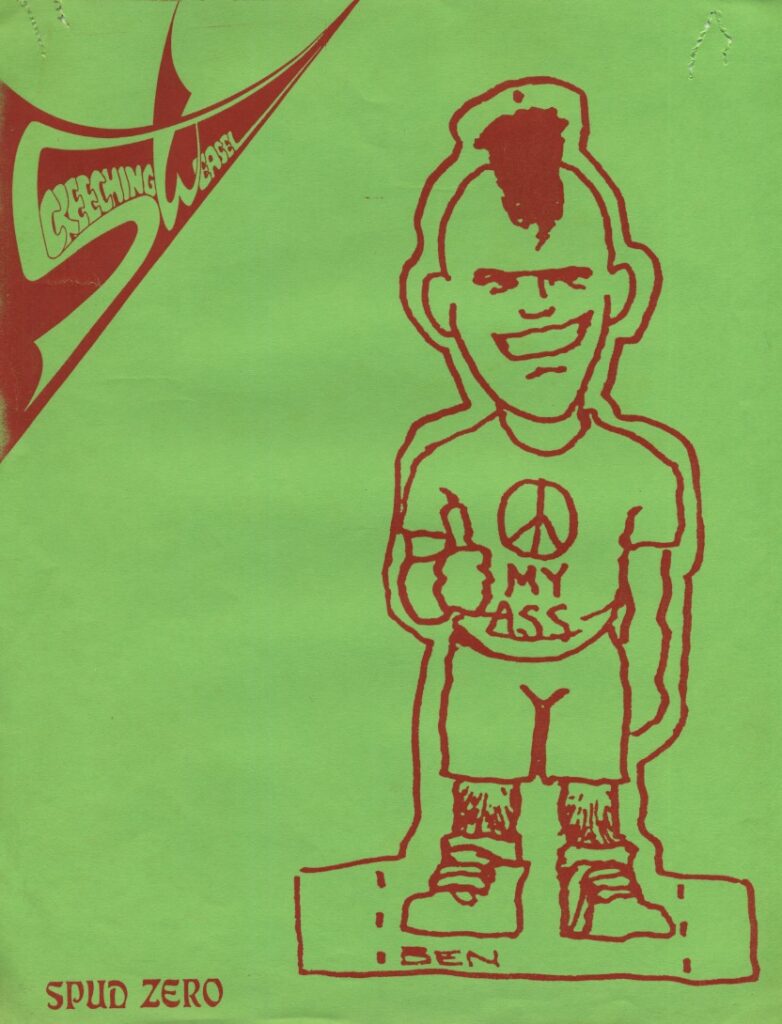
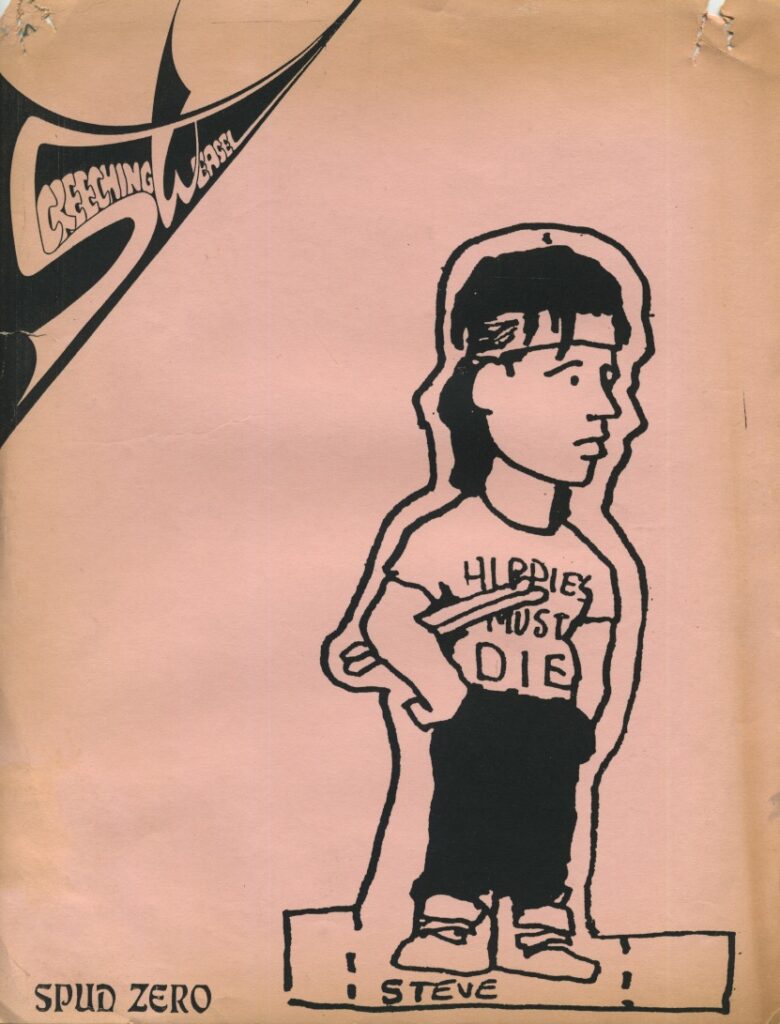
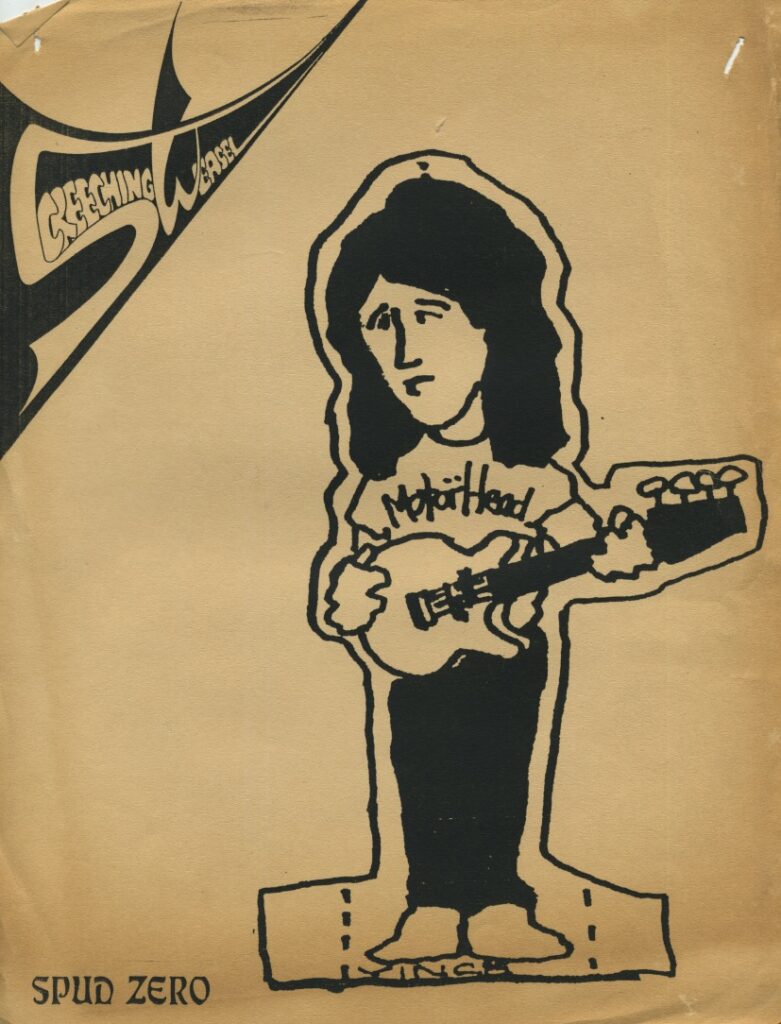
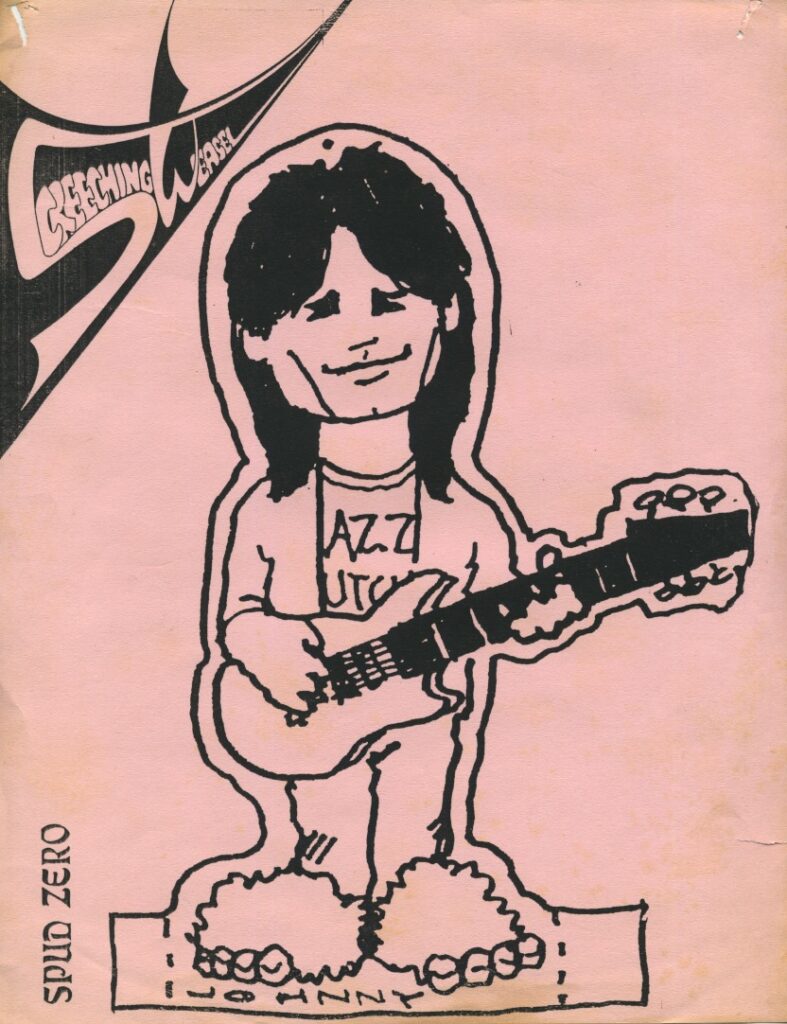
With the cartoons of the band done by Paul Russel, for SW’s debut record & the SW logo being done by Aldo Giorgini, father of Spud Zero’s manager Mass Giorgini.
Most people don’t know this, but you were already into theater by the time Screeching Weasel signed to Lookout and really got off the ground.
What exactly did your theater troupe (now publishing house) Hope And Nonthings entail, and how did you get involved with the Neo-Futurists?
I had been in theater productions since my junior year of high school. I continued working with people from school in comedy troupes and summer theater.
In the year between graduating from high school and starting theater school at Columbia College, Ben and I started the band. So being involved with theater preceded music but both continued to get equal time in my life. I always made time for both.
When I was on tour with Screeching Weasel, while not driving or sitting shotgun, I would be scribbling out new ideas for plays that I would produce when I got back. For a large part of the SW catalog. I was one for one for creating plays alongside records.
Hope And Nonthings was the company I formed with friends from college. I funded most of those productions with money that I was beginning to make with Screeching Weasel. Once we signed to Lookout! all my theater productions were taking most of that money.
I lived pretty cheaply and put everything into my theater productions. When I got a callback for one of the most well known theater companies in Chicago, The Neo Futurists, I stipulated to them that I was in a functioning band and that if something was scheduled for the band, it would take precedence over the theater company. Even though I made that statement I was brought into the fold. And around this time Ben started to have a lot more conflict with playing live and dedicating time to the band, so theater ended up taking over most of my time.
For about 7 years I was performing in a weekly show with the Neo Futurists every weekend, 51 weeks a year.
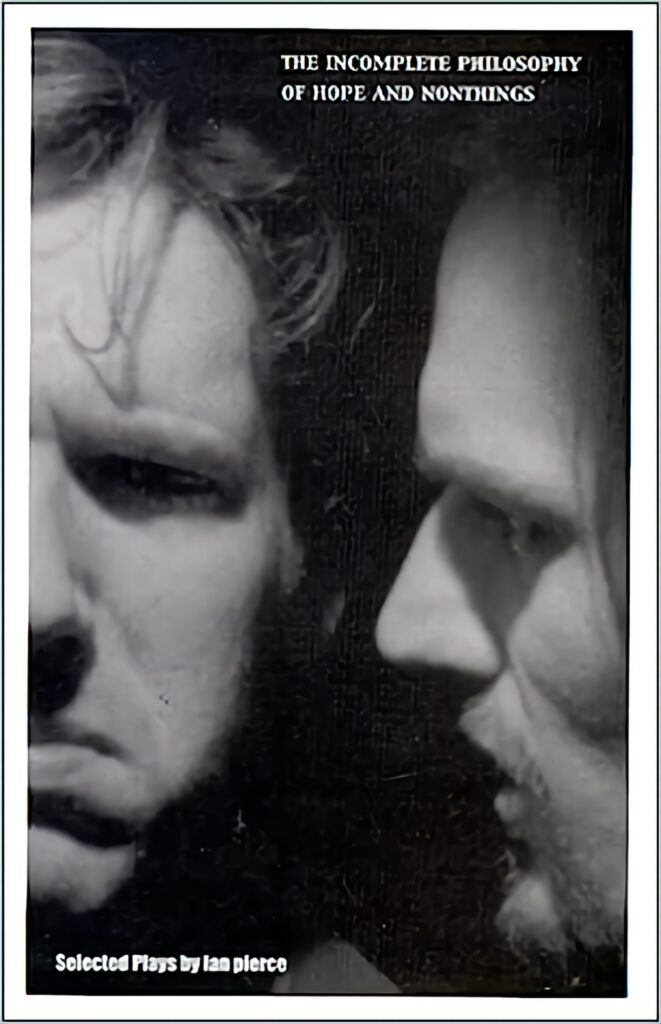
Published in 2000 by Hope & Nonthings.
Was there ever a point when you felt pressured to choose between music and theater, or were you always able to accommodate both passions?
I’ve known several people who are both musicians and authors, and most of them focus on one thing at a time. If they’re writing a novel, they’re not writing songs, and if they’re heavily into their music, their writing pauses.
What has that been like for you?
In general, I have never felt pressured by one or the other. I have always been part of collectives and I think this makes things easier to take a backseat when the other activity is busier. The machine that you create keeps itself moving by the power of ALL its parts. And sometimes you allow other parts to work harder.
The difficult choice is giving up a bit of control so you can focus on the other for a certain amount of time. You don’t want to be a person who is not in the room for the important discussions and yet you come in later with loud opinions based on a lack of experiencing all the details.
The knowledge of this has allowed me to pursue all the things at once writing, directing, and performing in theater and music. I just had to be at ease with myself giving up control of one or the other in equal parts.
My one gripe in hindsight was when Ben said to me that he only had punk and this gave him more ability to take control since I had theater and music. I had it better because my feet were in both camps and profiting from both. So I often allowed the directions SW was taking to change without much question or criticism, and left much of that in the hands of Ben, since he was doing it “more” full time than me. (Being the main songwriter and spokesperson for SW and also a writer at MRR and other zines, all his time was submerged in punk things.)
But years later, I regret my unconscious decision to demote myself within the band. As stated above, I told the Neo Futurists that my band, SW, would always take precedence. So I DID make a choice that the band was more important, and I should have been allowed more choices in the band that I had co-founded, than I or Ben had allowed myself. (For instance, I was offered a few times a gateway to being on the main stage at Second City Theater, and I always chose instead to take a tour or record a record for Screeching Weasel.)
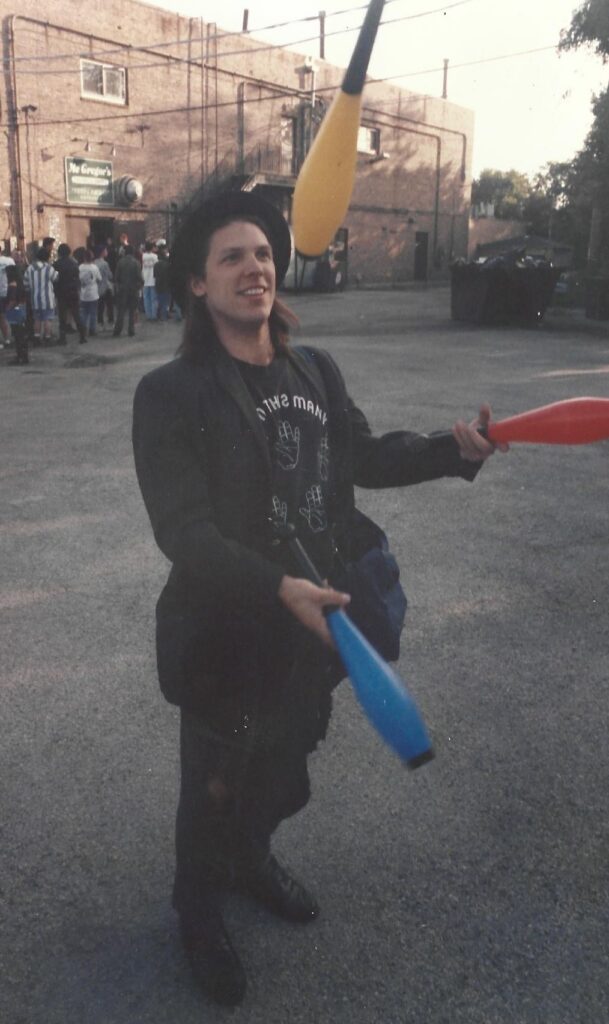
Photo by Jim Testa.
As a musician, you were known as John Jughead, John Pierson on your driver’s license, and Ian Pierce as a playwright.
Did those pseudonyms give you the freedom to pursue different avenues without having your reputation in one field impact you in the other, or did they serve another function?
The function you state was indeed one of my motives.
For most of my life, I felt strongly the impulse to NOT use my past successes as a stepping stone for other unrelated pursuits. I had a strong need to continuously prove something to myself… perhaps that I am valid in whatever pursuit I decide to take on (an insecurity). I want my creativity to have no borders for a certain media, and I thought the best way to be true to that was to start from scratch every time I started something new.
When I got a bit older and had my major falling out with Ben, with that decaying of friendship I felt left empty, as if a whole large part of myself had been taken away. I started reevaluating my need to keep “my selves” separate and in the background. At this point I went from John Pierson, ian pierce, and Jughead to just John Jughead Pierson.
The other reason sounds more artsy, but is also at the conscious root of it all. I wanted to trick myself to be somehow objective. I wanted my writing to be free of my baggage and prejudices.
My father had just died around the same time I chose to pursue being a playwright. I was angry and sad on levels I didn’t understand and so wanted to separate myself from his influence. Like many creators I had daddy issues. I am no exception. So… ian is the root of the name John, and Pierson is the son of Pierce. (Pierce being traced to the men in the clan that were in charge of being the archers.)
I was symbolically removing my past and replacing it with the original, unfathered, untethered, unique being. So I called my playwright personality ian pierce. And I made it lowercase as a nod to my favorite poet ee cummings.

Photo by Tim Carlson.
Another date that differs in online accounts of your life is exactly when you left Screeching Weasel.
By that point, SW had pretty much stopped touring and just made records, which I believe played a role in your decision.
But isn’t it also true that you handled a lot of the business end of the band, like divvying up royalties?
Can you talk about that period and what transpired, and how it coincided with your writing “Weasels In A Box” (a somewhat fictionalized account of the band?)
Oh, I can’t do this question justice…
A good portion of my mental space has been dedicated to understanding this time period.
The basic facts are that some of these timelines are based on SW releases which is not the whole picture. Ben and I were also friends and business partners running Weasels Inc. My last release with Screeching Weasel was “Teen Punks in Heat” in 2001, which Ben and I released on our label Panic Button Records. But I also helped compile the “Weaselmania” compilation, which came out in 2005.
The band had broken up so many times that Ben and I just got used to still working together through those periods on business and also other creative endeavors, often supporting each other both in encouragement and advice.
I won’t go through all the details here because I actually think it is a whole other book called something like, “Weasels In A Box Part II: The Ruthless Survival Instincts of the Ego.” But I offered to take a break from running the corporation because I was losing money and Ben was not taking my suggestions to alleviate the situation. So I quit Weasels Inc.
I never quit Screeching Weasel. Ben took advantage of my moment of weakness and created a barrier between us that gave him leverage and control of the corporation and the band. I did not fight. I had created Even In Blackouts by then and I thought the energy to fight for my rights in the band would seriously injure my time to dedicate to Even In Blackouts which filled many emotional gaps for me that SW was not giving me. So I gave up the pointless battle against Ben in 2006. But I hold claim to being the founder of Screeching Weasel, it is still my baby, and I will always hope that it survives, for my own sake but also for its own.
“Weasels In A Box” was a novel that started out as a journalistic article for a punk zine about The Lillingtons, but it lined up with the big arguments between me and Ben. So it holds many keys to that dissolution of a friendship and partnership.
I actually think Ben sees this book as my breaking with his vision of what the band was to us both.
I wrote the novel, first because I wanted to write a novel, but secondly because I was disappointed in Ben’s attempt to write about the band in (his novel) “Like Hell.” I thought he stripped away the crucial elements of the band and – ironically for a guy who never feared offending people – I thought it was a very SAFE book in regards to telling our story. And he killed me off… that sent me down a multitude of paths theorizing about psychological and metaphorical implications of writing about such an overtly fictional thing when the band itself in the Real World was much more interesting.
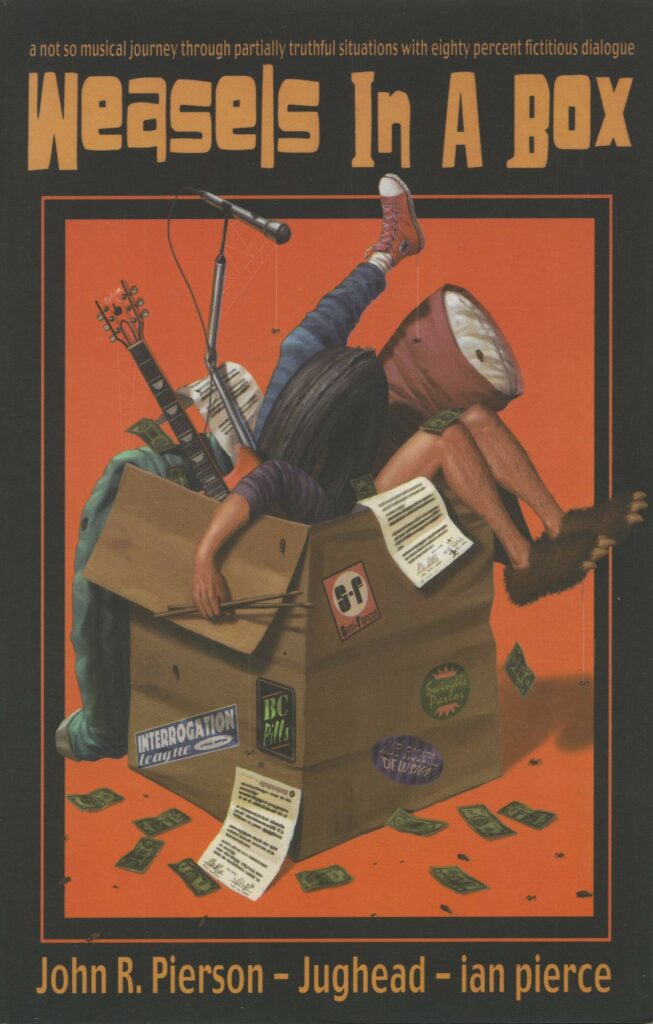
You formed Even In Blackouts (EiB) in 2002, at a time when I believe Screeching Weasel was in one of their several hiatuses, but even so, the band represented a significant departure, since it featured acoustic instruments and a female singer.
How did EiB come together and how did that relate to your role in Weasel?
I didn’t really consider myself a writer of songs until I had the idea to form EIB. Of course I had written songs for SW. Plus I had been writing songs since I was like ten on my mandolin, but I never considered myself an actual songwriter.
I went to Palermo, Italy to visit my friend Stefano. I had just destroyed my guitar on stage at the House Of Blues in a moment of rage and frustration, so instead of confronting the root of that I fled to Italy to work on a book. While there Stefano gave me an acoustic guitar to mess around with, and I wrote what I consider to be my first real song, “Missing Manifesto.”
It was energetic, melodic, and punk in spirit, but I didn’t hear it made as presented in the way I had done before. So when I got back to America I thought through these ideas and decided to get a female singer with a voice somewhat like a modern day Mary Poppins (my favorite movie to this very day) and to back it with an acoustic ensemble.
I wanted it to be a band that just played live and didn’t record, but that quickly changed when I really began to love what we were doing.
In the beginning of EIB the relationship between me and Ben had already begun to decay but we were still friends. We were still conducting business and meeting at his house weekly. This new band gave me what I was not getting in SW, but at that time it was not an impediment. Ben even told me he liked what I was doing.
I don’t think it ever really was a cause of any trouble, but my passion for what we were doing in EIB may have caused my mind to rewrite its wiring and rethink what was happening with SW. That is just a theory, I really don’t know for sure.
One of my fondest memories is being with you on an early EiB tour at a poorly-attended show on a weeknight in an all-ages venue in Bound Brook, NJ, and you made a little speech saying, “This is exactly what it felt like when I was just starting out and nobody knew who we were, and it feels really good.”
Can you talk about that feeling and what you meant?
That harkens back to me having to prove myself over and over again to myself.
I believe in the underdog and what hard work needs to be put in making a mark in the world for the first time and the fulfillment that comes from facing and overcoming such instability as proving oneself worthy of praise or mild acceptance. And even though I would have loved the world to dig what EIB was doing I appreciated the opportunity to have to fight and prove myself again.
Having you, Jim Testa, in the audience reminded me of the insane amount of hours Ben and I had put into making SW a functioning band. I will always be proud of us for that, and it is what continues to keep Ben in my thoughts, (and all the other members that came and went.)
It hurt to be on the bottom again without much notoriety but it also felt right and good. I just love playing music, and playing it in a nearly empty room, even though technically this really doesn’t help my career, it still helps my soul.
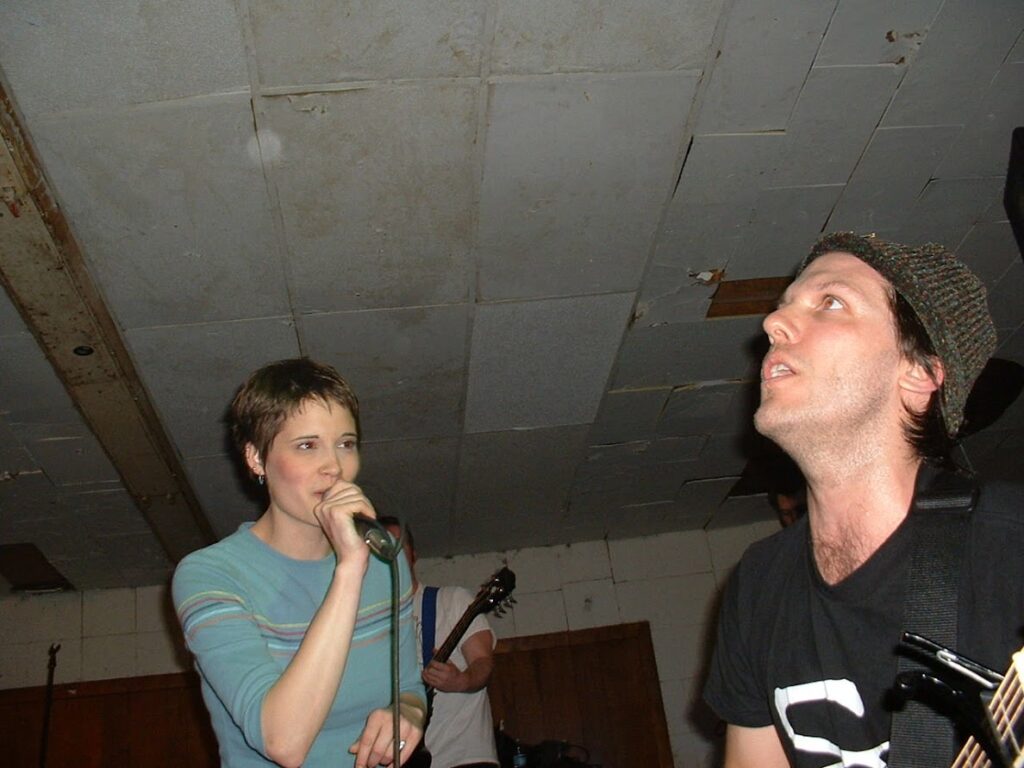
After “Weasels In A Box,” you wrote the 2011 novel “The Last Temptation of Clarence Odbody,” which imagined an alternate life for the angel in “It’s A Wonderful Life.”
Have you ever thought about writing another novel?
Have you had ideas for one that you never realized?
I became a playwright to hash out characters for my first attempt at a novel called Hats Off (to those who have died and to those who will.) I had been working on that book since I was about 13.
But being presented with a quicker option of giving words to actors and seeing these words actualized in real time in front of my eyes was more enjoyable at the time than sitting in a room for months at a time by myself. So I began dedicating my writing time to creating theater instead.
I still often pull from that unfinished novel.
“Weasels In A Box” reopened my eyes to the fulfilling challenge of writing long form. It takes me years to complete a book so I can’t always justify the time it takes to do it consistently. “Weasels In A Box” took seven years. “Clarence Odbody” took 4 years.
Currently I am working on my third novel called “The Plight Of The Lampoons.” I am in my fifth year working on that novel. Part of my reason for taking my current job in Japan is that there is a lot of downtime in the job, so I sit in a cafeteria for hours unsupervised.
I am filling this time with writing this new novel and working on the Jughead’s Basement podcast.
Plus – “Weasels In A Box” will be republished and released in paperback, ebook & audio book by Rare Bird Lit later this year.
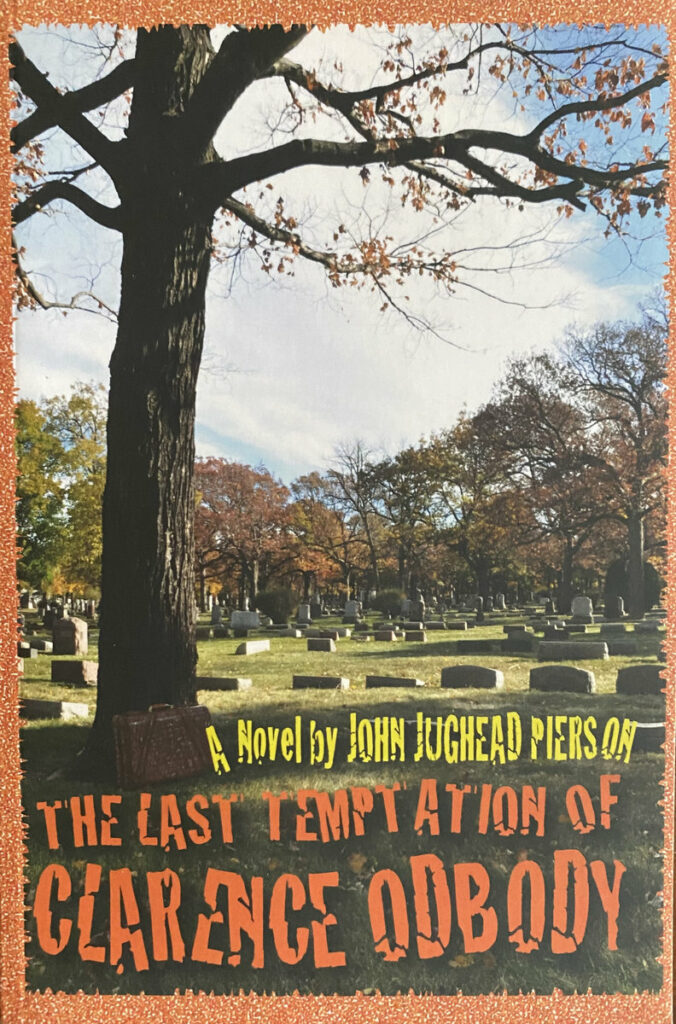
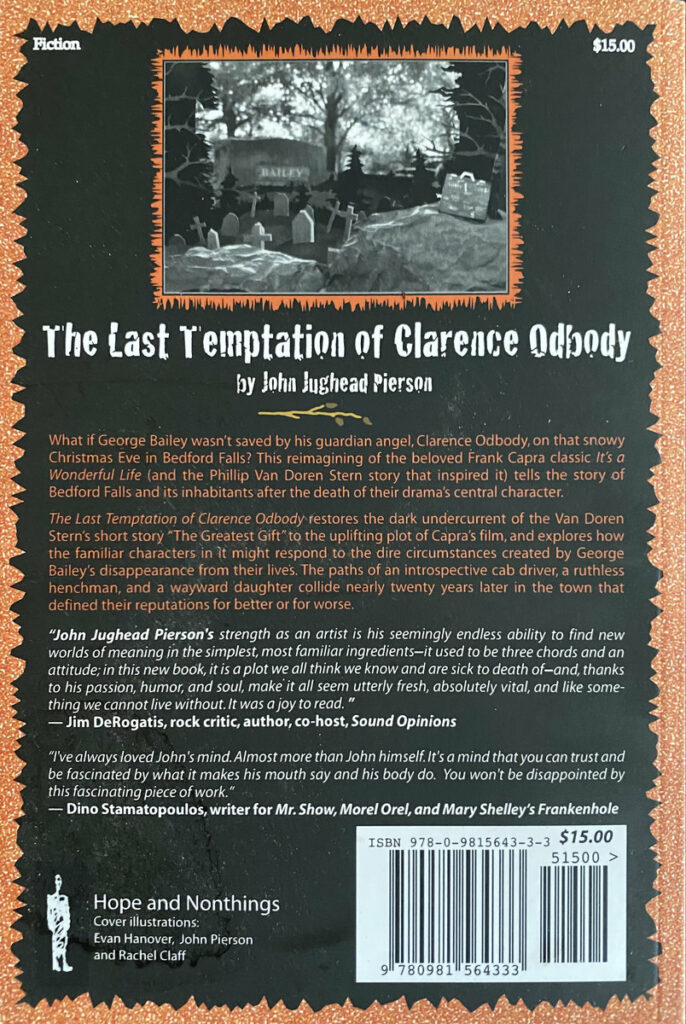
Published in 2011 by Hope & Nonthings.
You were very much a child of the DIY era – you started your own theater company, you helped start two record labels (Roadkill and Panic Button,) you self-published your own novels, you booked tours and set up shows… all in the days before personal computers, smartphones and the Internet.
Has the online revolution made it too easy to be a band today, or do you see that same spirit of entrepreneurship in today’s musicians?
The internet has made your material easier to get out there and quicker to digest but I can’t rightly say it is better. The hard work has to be put in other places and if you rely on the simplicity that the internet has given us, I feel some of the substance can be sucked out.
I felt then and I feel now that nothing that comes too easy can fill all the gaps in what gives artistic pursuits its meaning. One can get stuff out there quickly but that doesn’t stop you from feeling empty inside and unappreciated.
I think we still face the same creative problems. But in regards to the evolution of the internet and chatbots and AI, I have no enlightening words on how that will affect me or music or art in general, but I have started to put some thought into that very near and present future.
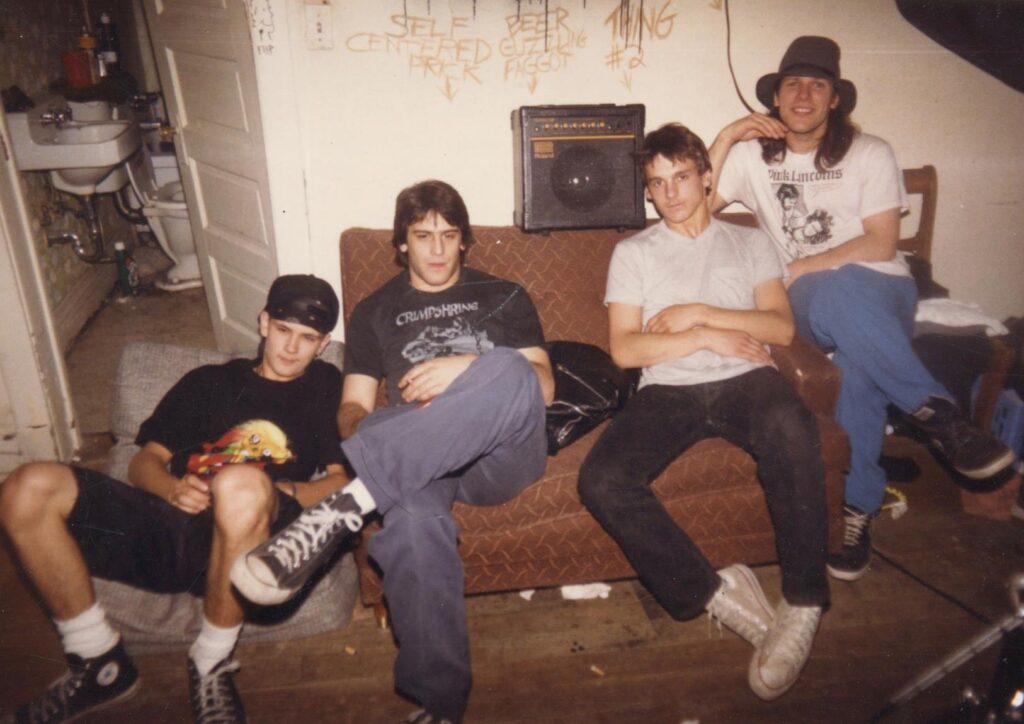
Photo by legendary punk musician, photographer & scenester Martin Sorrondeguy, for the Punkhouse EP photo session.
You were also part of a generation which, through both happenstance and hard work, was able to earn a sustainable living from punk rock.
Given the changes in the world and the music industry, is that possible for a young band anymore?
What advice would you give to young people who want to live off their music?
I kind of want you to take this question out because I don’t even know how to maintain a living.
We got lucky with the timing of the band. This doesn’t take away from our hard work or talent but I can’t deny that the timing was right for us and our compatriots. It was time for music to shift. And I don’t think it is an exaggeration to look at all aspects of the world around us today, be it entertainment or politics or social networking, and notice a direct lineage to what we were a part of.
I claim both the good and the bad in that statement.
This was a product of hard work but also randomness and timing.
I don’t know what a band should do other than believe in what they are doing. If they want to be happy at the end of the day or the end of their band, I think the most happiness will be from not the fame or money but the creative achievements pursued as if on the edge of your ability or at gunpoint on a cliff. This anxiety/enthrallment only pales in comparison to the human connections forged along the path.
If you want to make money, and art is just a means to that goal, then sell the fuck out of yourself, burn bridges, lie, cheat, steal ideas, do whatever is necessary. But I don’t think you will be happy on your deathbed… unless you are an egomaniacal genius or a psychopath… or both.
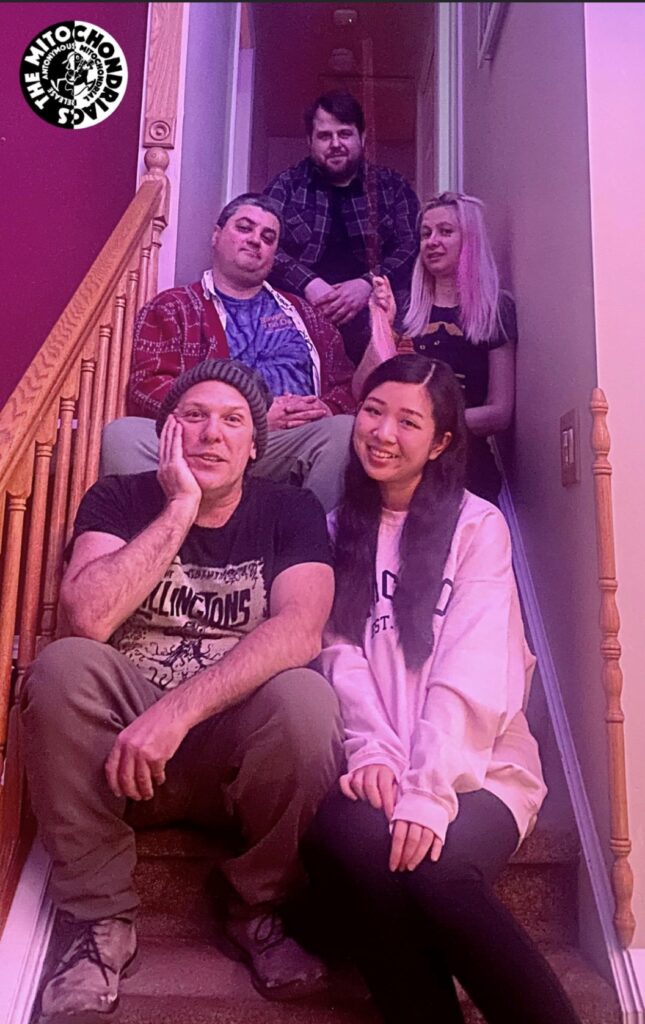
In recent years, you’ve become best known in the punk community for Jughead’s Basement Podcast, in which you interview musicians. While the format has evolved over the years, you’ve been able to land some surprisingly notable guests and you’ve developed an interview technique that’s markedly different from what someone might learn in journalism school.
Can you talk about your approach to interviewing, how you feel it’s unique, and what you look to achieve with each guest?
I think my experience in bands, running a corporation, writing for theater, the patience of writing a novel, being a fan of music, and a fan of people’s diverse personalities in general gives me a natural curiosity that I can channel into guiding conversations with artists and creators.
One thing I have advertising about myself is the ability to engage in active listening. Which basically means I have to do my studying and have my copious notes but I also have to be willing to go off in uncharted directions at the drop of a hat, and to be comfortable pursuing avenues where my guest seems most interested based on the words that fall from my guests’ mouths.
But also as a kid, from having observed my dad at work as an aluminum siding salesman, I had witnessed him engage in techniques used to keep a customer happy, entertained, and in a space for accepting. It is important to keep a guest comfortable but also simultaneously a bit off balance, just enough to get them to say some very genuine things that even surprise themselves.
I am also an avid fan of philosophy and psychology so those interests fill out forging fairly unique paths of inquiry.
My years of performing and teaching improvisation also come into place. Ideas have to be thrown out to keep the audience watching, and some of those ideas are predictable and some of them come from a place I don’t even understand, but I have to give them equal weight and allow them to flourish or flounder, and I have to have the confidence to bring it back from a crash that seems inevitable at the time.
I am also an avid fan of long form interview podcasts such as Sam Harris (Making Sense Podcast), Ginger Campbell (Brain Science), Michael Shermer (Michael Shermer Show), amongst many others. I also watched old political shows from the 60’s and 70’s like Barbara Walters, Dick Cavett, Walter Cronkite, Johnny Carson, etc…
I am still learning.
It is like I am still in school. The only difference is it’s a curriculum of my own design and I don’t have to pay tuition.
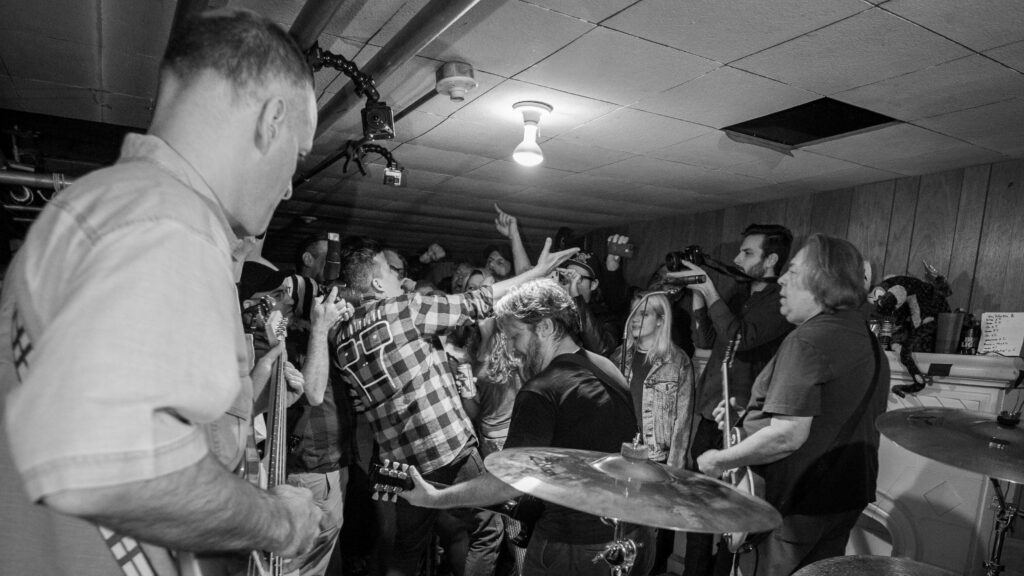
With the band onstage featuring Johnny Personality, Johnny Puke, John & Dave Parasite.
Photo by Lori Patton O’Hara.
You are currently living in Japan, which you’ve done off and on for quite a few years now.
What is the best thing about being there (besides your romantic relationship, which is obviously first) and other than the language, what is the hardest thing about being an American living in Japan?
I am at peace here often.
There are still social pressures, if not more, and political disarray, but there is more of an acceptance of nature and society in this culture. They embrace solitude and the importance of society and family. They can hold those different ideas in their head simultaneously.
I love hiking and getting away. Osaka is set near water and also what seems like endless mountains and forests. Hiking is part of their natural religion, therefore there are paths everywhere.
I love the food.
Osaka is a sister city to Chicago, and I can see why. It is very blue collar here, people work hard, love hard, drink hard, and eat fabulous food.
The hardest thing for many is to experience and accept the shame culture here, the levels as to which things that aren’t your fault are ultimately your fault. It is hard to accept their willingness to accept the absurdity of bureaucracy, in business and politics, and in everyday social negotiations.
My criticism of this culture, and I am stereotyping here, is that through history they have had an on and off relationship of exiling themselves from the rest of the world. This historical flirtation with isolationism affects a person in the foundations of their being. Japanese are less willing to bring a stranger into their inner networks. They will be friendly with you but you can feel the isolation, the difference of being considered an “other.”
With all that being said, I love many people here dearly, and I cannot picture my life without them.
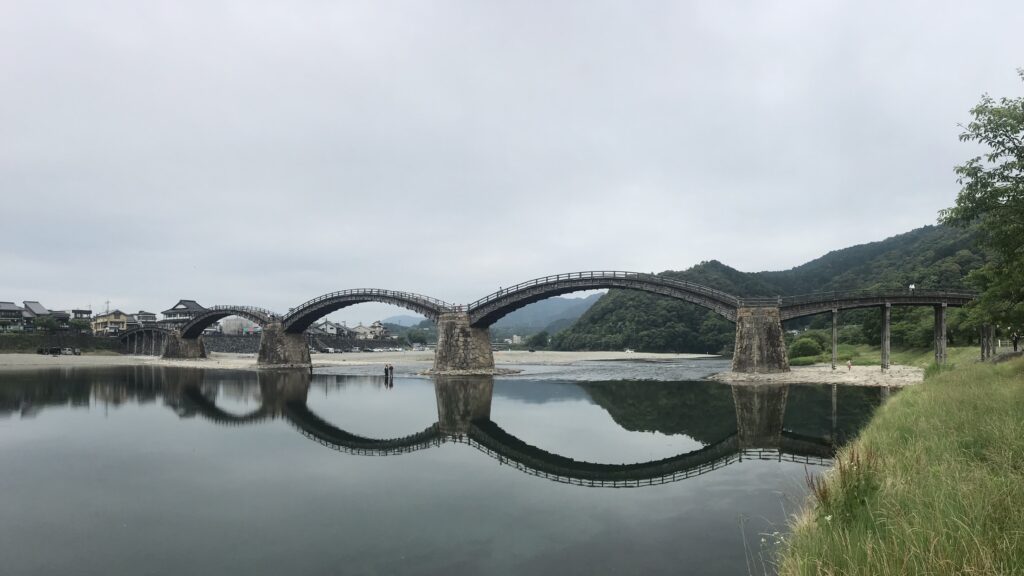
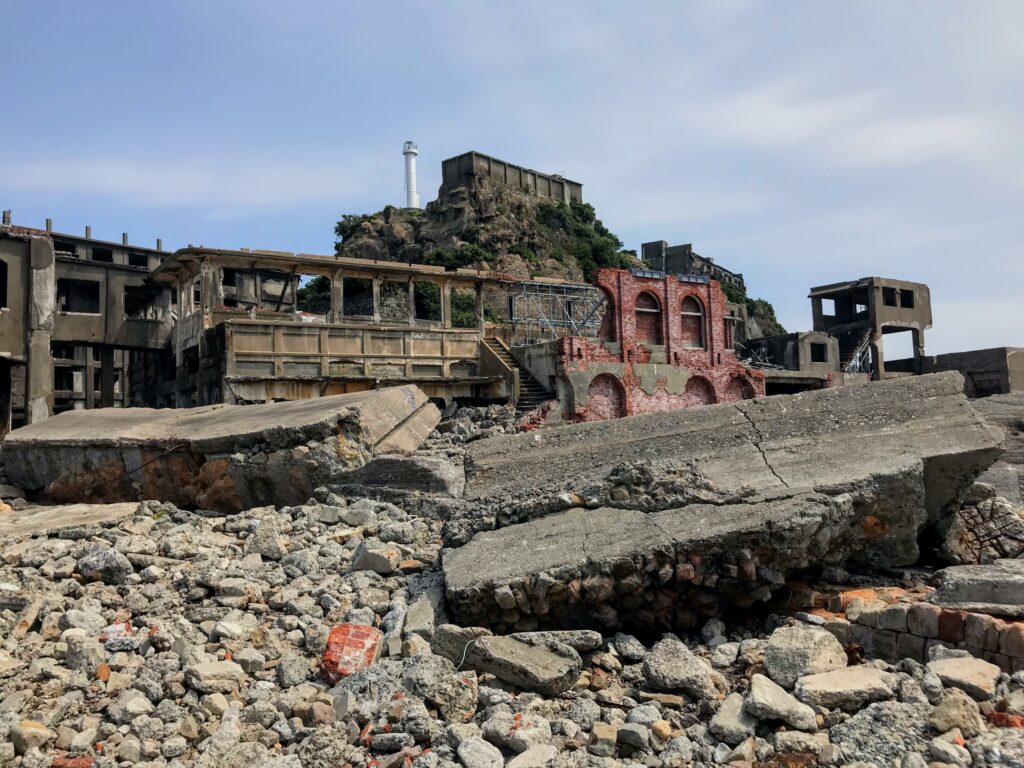

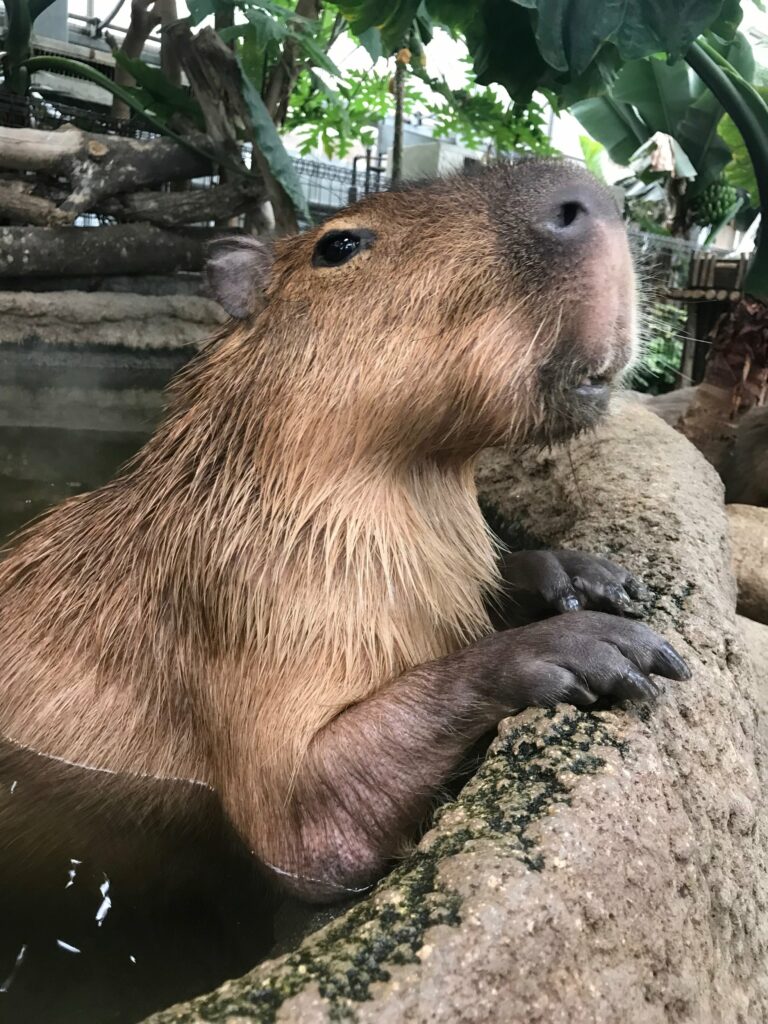
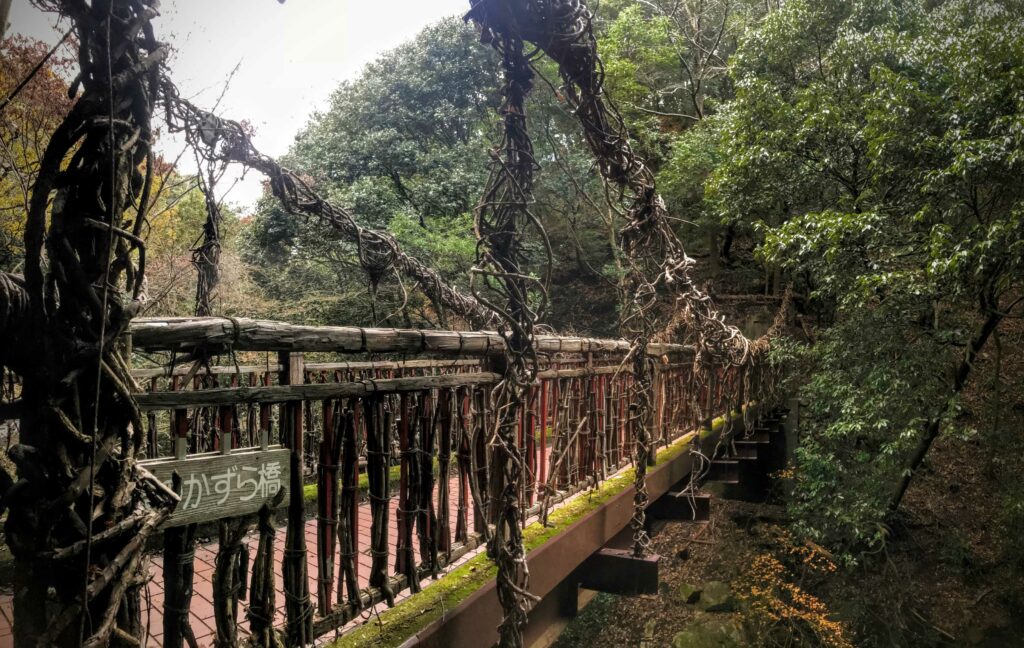
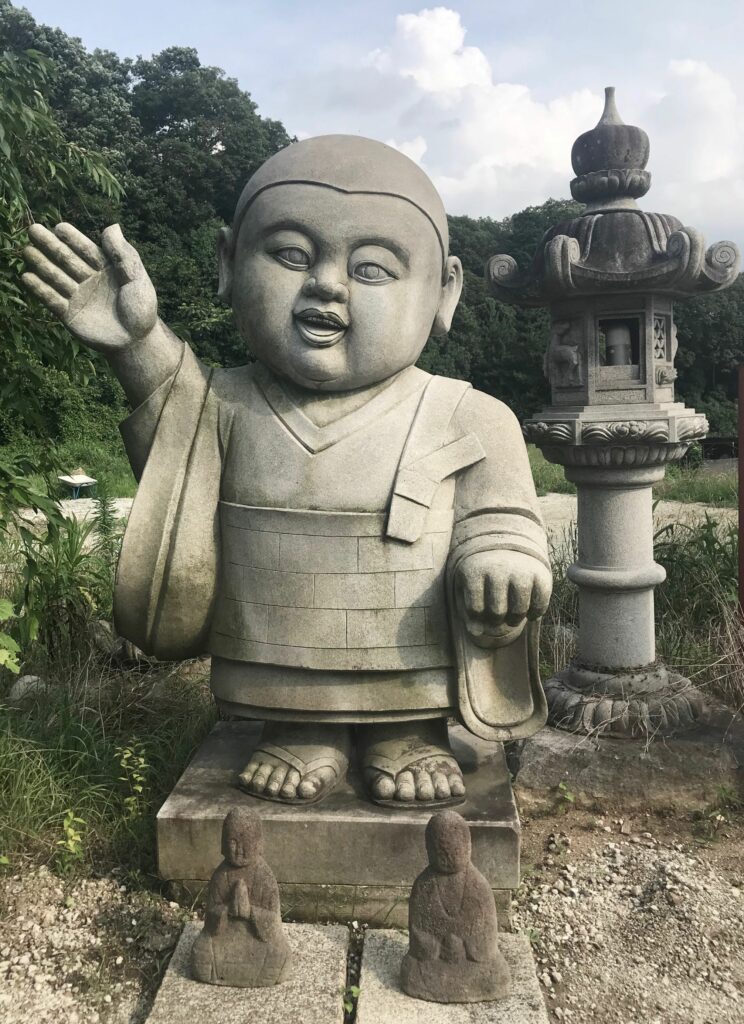
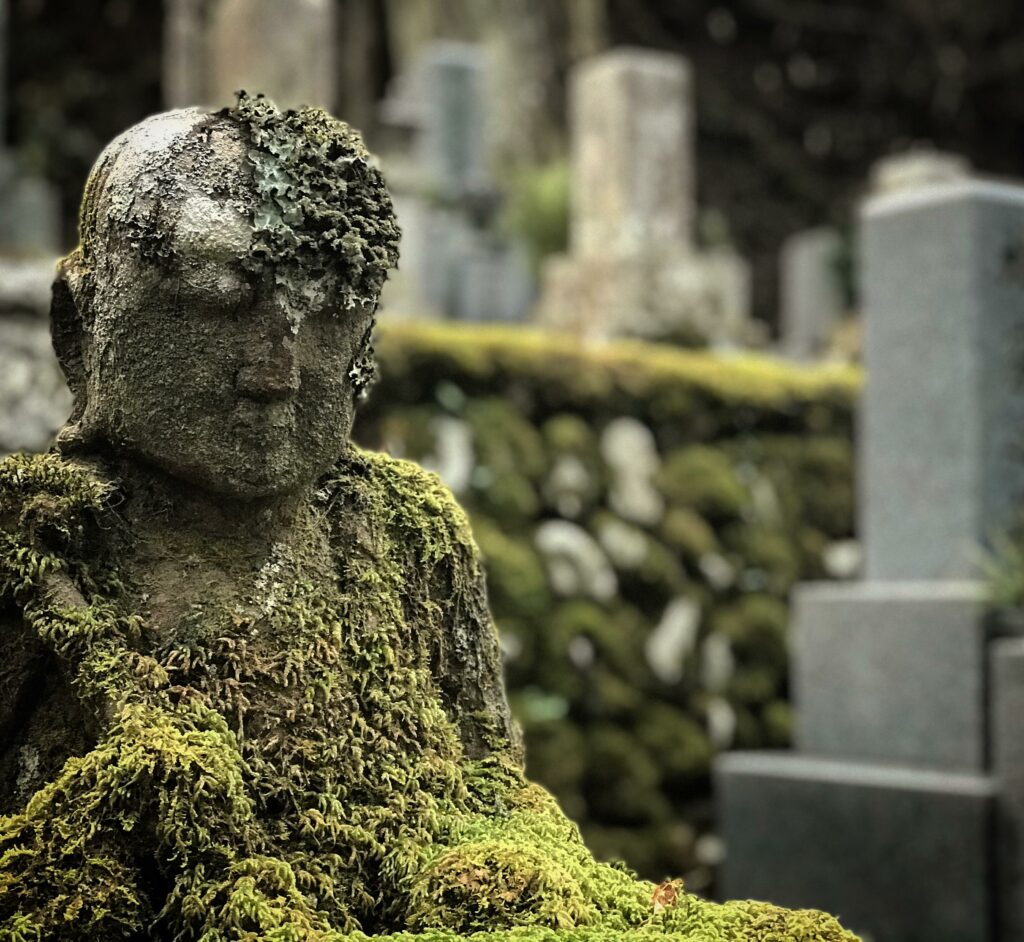
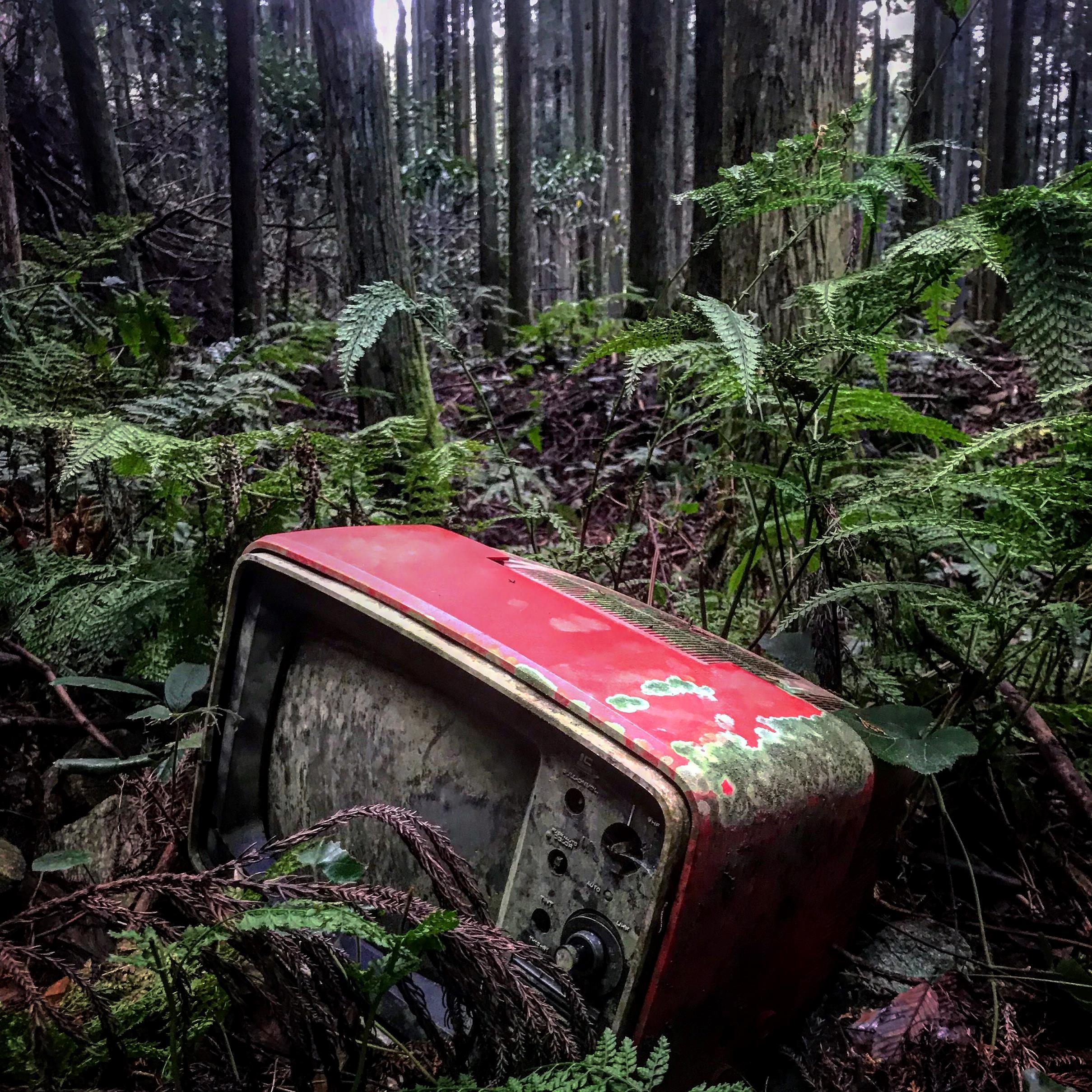
Links
- John ‘Jughead’ Pierson – twitter
- John ‘Jughead’ Pierson – YouTube
- John ‘Jughead’ Pierson – Discogs Entry
- John ‘Jughead’ Pierson – Facebook (Personal)
- John ‘Jughead’ Pierson – Amazon Author Page
- John ‘Jughead’ Pierson – GoodReads Entry
- Jughead’s Basement Podcast – Website
- Jughead’s Basement Podcast – PodOMatic Page
- Jughead’s Basement Podcast – Facebook
- Jughead’s Basement Podcast – Instagram
- Even In Blackouts – Bandcamp
- Even In Blackouts – Discogs Entry
- The Mitochondriacs – Bandcamp
- The Mitochondriacs – Discogs Entry
- Semi Famous – Link to Buy Their Debut 7inch, “Middle School Monster” b/w “Want”
- Screeching Weasel – Bandcamp
- Screeching Weasel – Discogs Entry
[Header image of John by Nanako Nishio, taken at The Hyogo Prefectural Museum of Art in Kobe. March 2023.]
All images supplied by John ‘Jughead’ Pierson & Jim Testa, or sourced online.
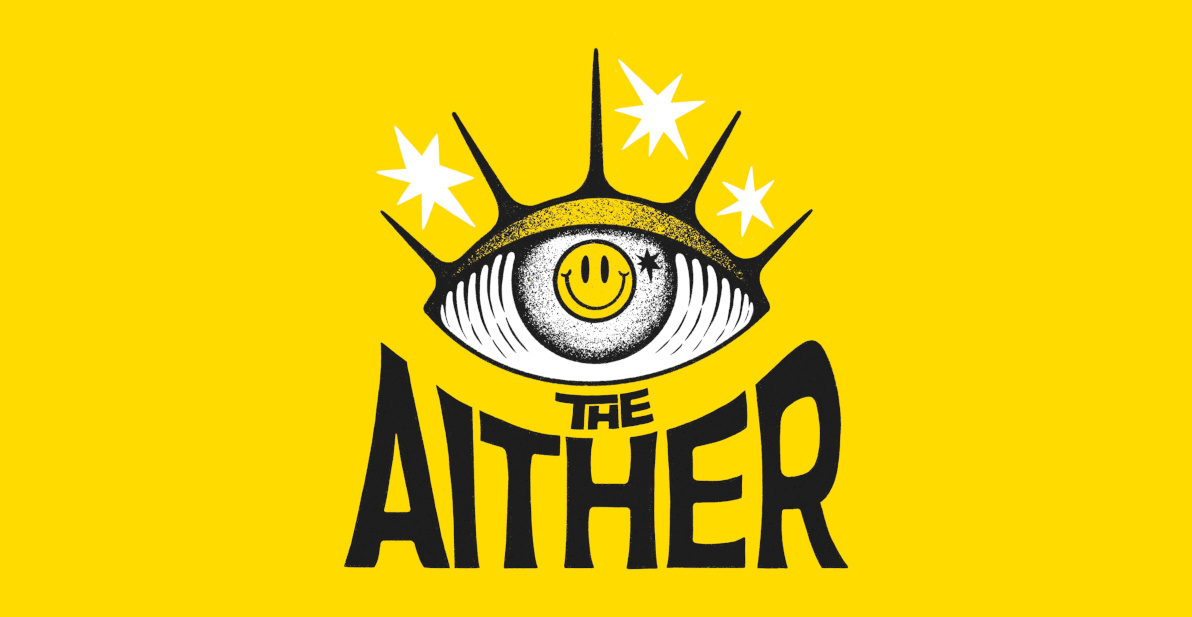
![We Chat With John ‘Jughead’ Pierson aka ian pierce – Writer, Thespian, Musician, Podcaster at Jughead’s Basement Podcast; Founder of Hope And Nonthings Theatre Co. & Publishing House; Founding Member of Bands ‘Screeching Weasel’, ‘Even In Blackouts’, ‘The Mitochondriacs’ & ‘Semi Famous;’ & Co-Founder of Record Labels ‘Roadkill’ & ‘Panic Button’ [Yeah, the bloke has done a lot we know!]](https://theaither.com/wp-content/uploads/2023/06/IMG_7679-sml-scaled.jpg)
